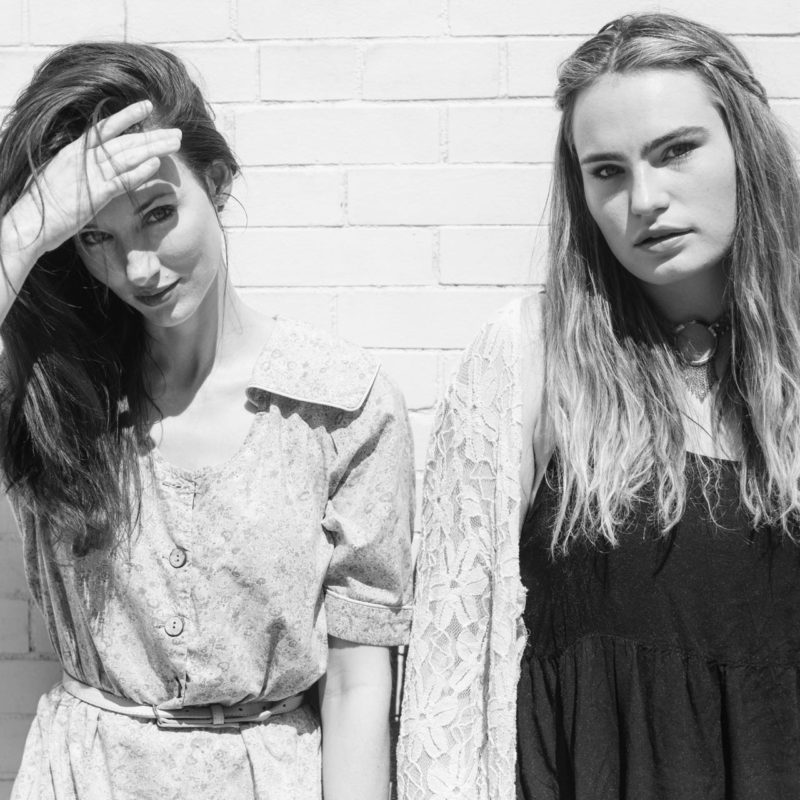Women of NYMF 2016
Throughout July we’ll be featuring women involved in this year’s New York Musical Festival. NYMF’s goal is to support the development of new and diverse works of musical theatre, and over the coming weeks we’ll be spotlighting a mix of the women involved: from actresses to directors, from Tony nominees to those just beginning their careers. The shows they’re a part of represent a range of styles and subject matters, and are all at different stages of development. We visited them at rehearsal studios throughout Manhattan to find out about their shows and their thoughts on the theatre.
Elizabeth A. Davis and Kathryn Gallagher of Dust Can’t Kill Me
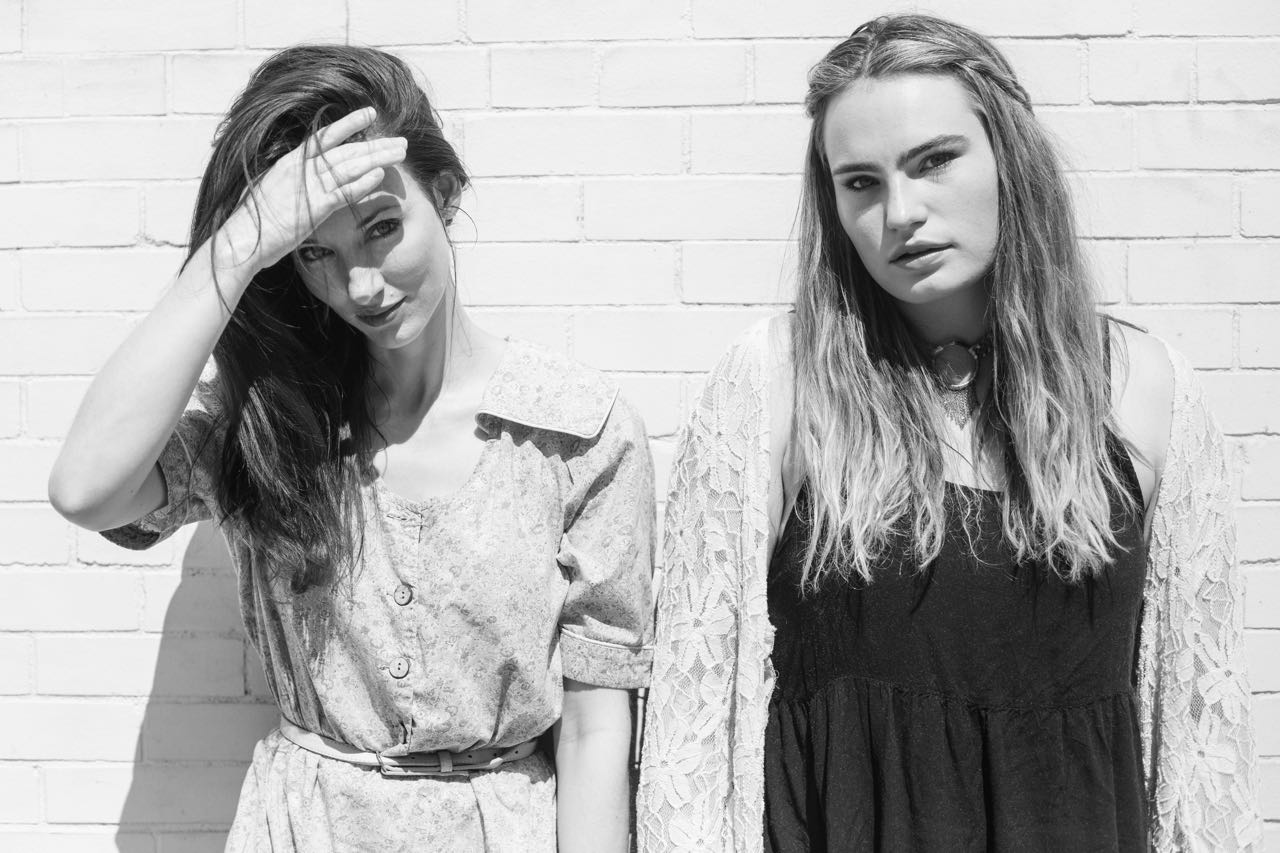
Photography by Tess Mayer
“Drought, desperation, and a prophet’s promise of Paradise set a ragtag group of wayward souls on a Dust Bowl journey into the desert. When they arrive, their promised land is unlike anything they ever imagined, or anything they ever desired. Driven by a spirited band of actor-musicians and directed by ‘Spring Awakening’s’ Srda Vasiljevic, the new folk musical ‘Dust Can’t Kill Me’ asks what’s worth fighting for when all you’ve got is dust.”
Starring Elizabeth A. Davis and Kathryn Gallagher. Performances on August 1st, 2nd, 3rd, 4th, 6th, and 7th. For more information, click here.
What are you hoping audiences take away from the show?
Elizabeth: I think that we are coming into a time where I truly understand what escapism theatre is, because we’re in such an insane period in our culture that I want people to come in and be able to enjoy being in the theatre. Secondly, I want people to have a deeper appreciation for the dust bowl and the things people went through in our country years ago. A third thing is I want people to reflect on how people around the [country] may be different and have a deeper empathetic understanding of people who are different than them.
Kathryn: One thing that I think is really interesting about this show is I think it really demonstrates how you can be your own worst enemy. If anything, I hope it is holding up to a mirror and looking at what happens if you don’t get out of the way of yourself, and what can happen when you push that aside and keep moving through. I think for me that’s a big takeaway, having worked through the show, is that almost every character’s biggest obstacle is themselves. I think that’s, on a more singular level, a nice takeaway.
What about this development process have you found the most useful or the most interesting?
Elizabeth: I think doing anything that’s really hard is always interesting and useful. We have four weeks to learn a brand new show that’s changing every day, learning it on an instrument, we’re learning our lines, we’re learning our vocal parts, so just getting into that mindset of here’s our timeframe, here’s what we need to learn, and then you have to live it and dive in so fully. I think any experience where you have to dive in is useful.
Kathryn: I think it’s always interesting to see how people on all sides of the creative team can come together in the room and create one cohesive entity, like a theatre piece. That’s incredible. There’s so many ways to be involved in the process of theatre making. I always think it’s interesting to see how different people do that successfully. I think it’s useful for actors to be working. It’s useful to put good music into the ethos.
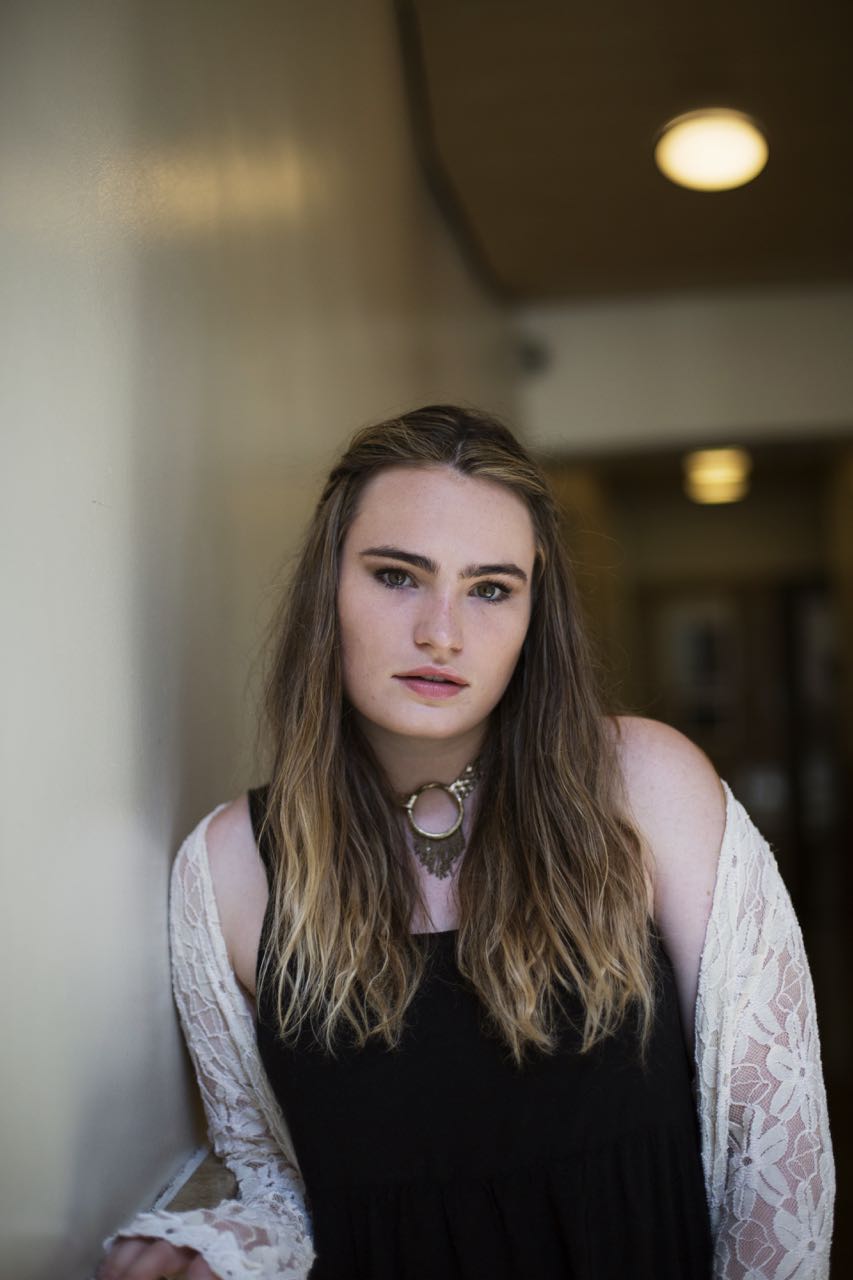
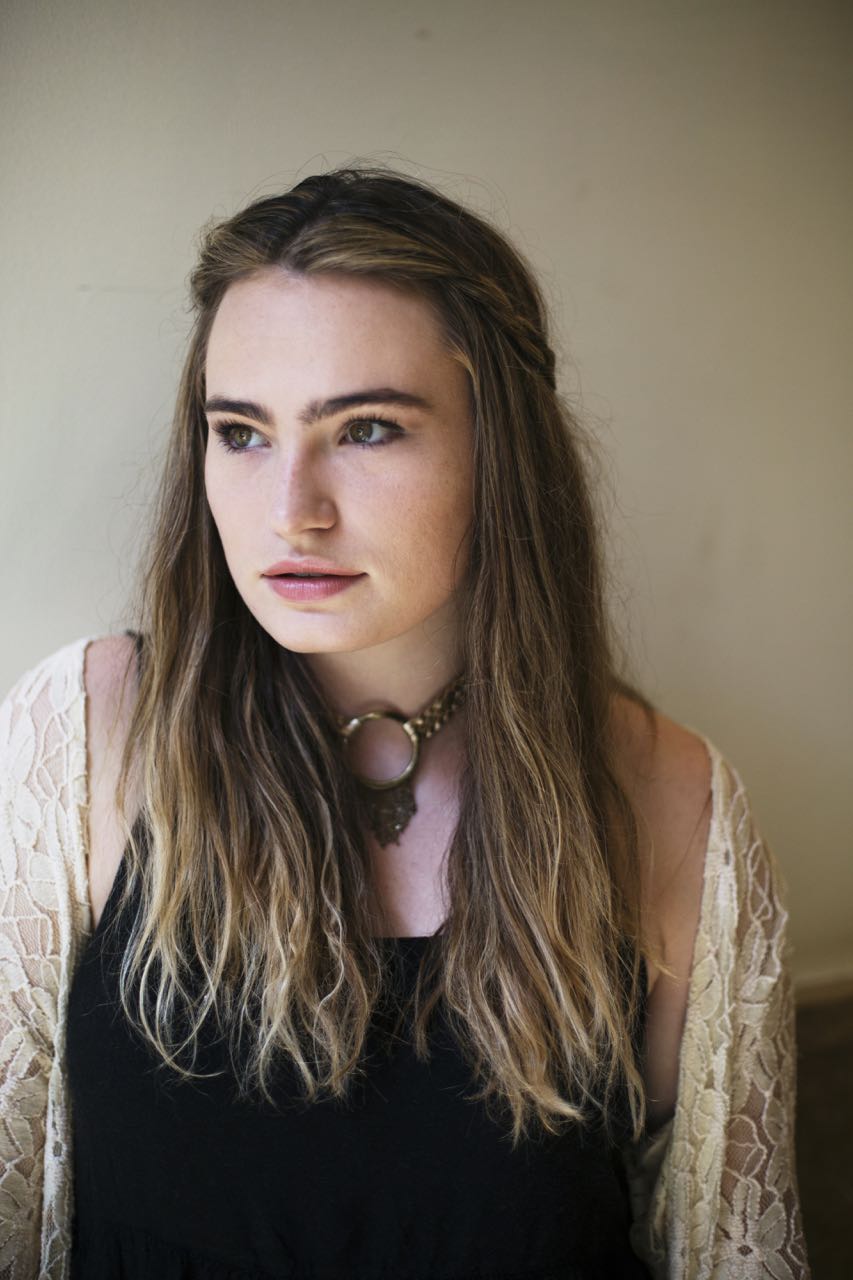
What’s something you think can be done to improve the development of new work?
Elizabeth: I have strong feelings about this. I feel like protecting the creatives in the process is always imperative to helping burgeoning work. I think time constraints are an enemy, I think financial constraints are an enemy, and I also think putting press and/or critical eyes on a piece before it’s ready is really detrimental. I think that NYMF is great in allowing people the space to create safely. In general, I feel as if the pressure of time and the pressure of putting a piece on the chopping block too early is, in a lot of ways, killing American theatre.
Kathryn: I think that it’s really hard right now. Living in New York City as an artist, having the financial means to be able to get into a room and do this at all is a huge feat that not many people get to do. A lot of times, even the people that do get to do it are still working with so much less than they really could use or could need. It’s going to always be tight and tough. I always look back on Spring Awakening—that that production took eight years to become what it was. You’re birthing a child. You’re creating someone and you have to allow time for that.
What’s something you think can be done to get different audiences to engage with theatre or get audiences to engage differently?
Kathryn: I think that having work that speaks to this younger generation is really important and I think there’s so many incredible shows of yesterday but it’s, again, putting the time and energy and money and the excitement into new work that’s going to speak to younger generations, that’s going to make younger people want to spend their money on going to see a Broadway show. Ticket prices are high, that’s for sure, but it’s also high going to see Selena Gomez in concert. People will find a way to get to the things they’re passionate about. I believe that fully. I think it’s connecting to what people want to hear, what people feel and connect to, and making it so they don’t have to step so far outside of their normal life to connect to a show.
Elizabeth: This is a larger systemic issue, but I feel like what I’ve witnessed in the last seven years, and I think it’s starting to be a trend, is that a lot of good stuff that should be seen by a wider audience is just financially killed early on. I think that tax breaks on Broadway need to be championed in the same way that we have for so much film and television going on in New York City because they’ve been able to get good tax breaks. I feel like the theatre definitely needs the same thing.
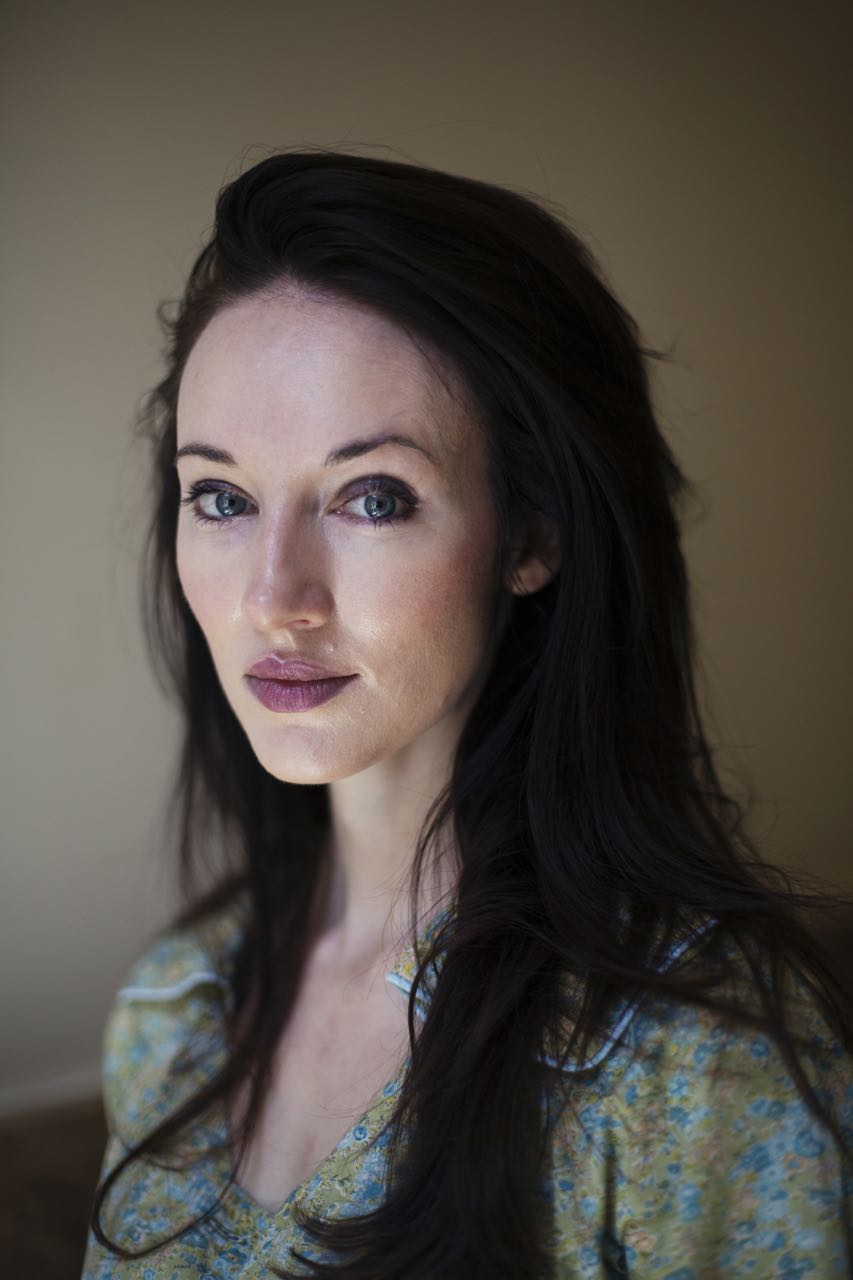
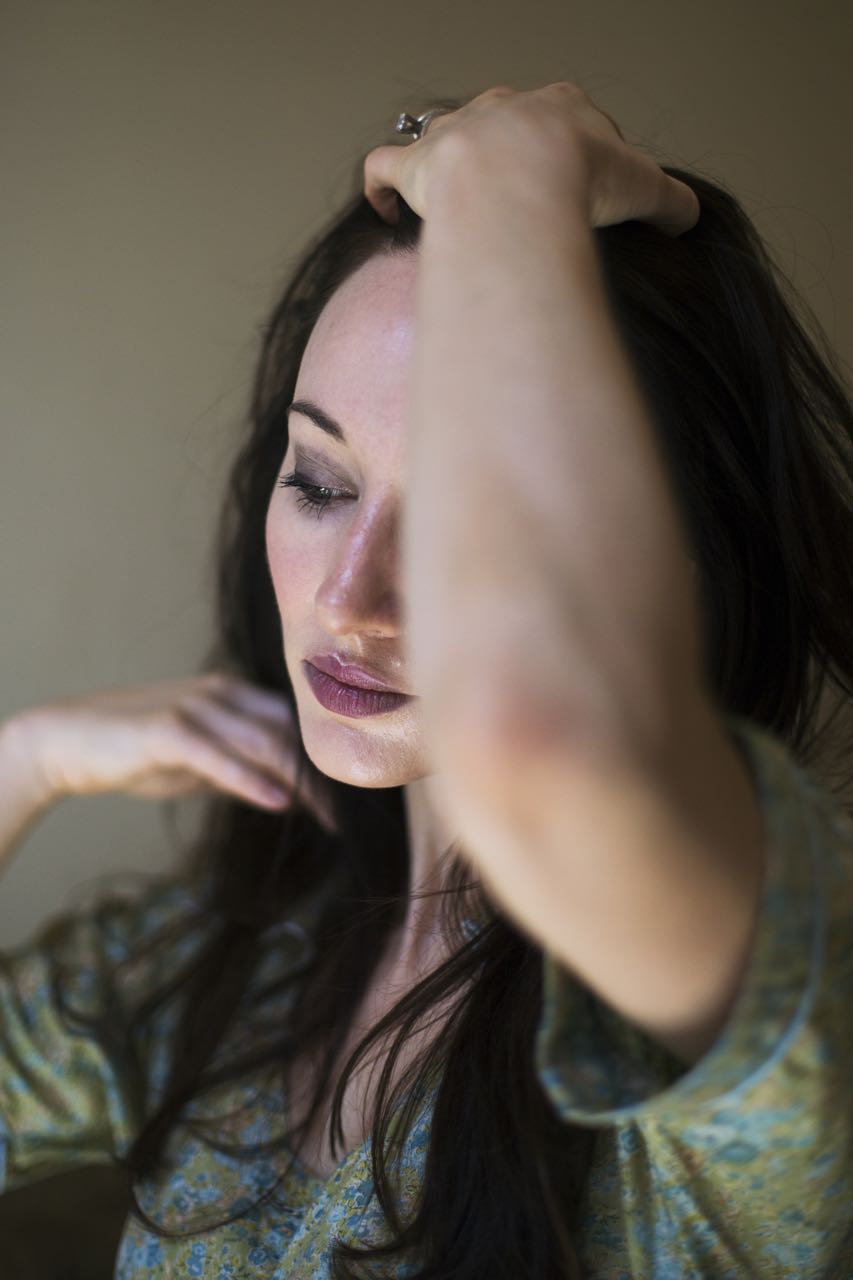
Beyond being located in America, what does the term “American theatre” mean to you?
Kathryn: I saw Shuffle Along last night and it’s been on my mind. To me, that was American theatre. It’s such an American story of coming up against all odds to do what you love. At the end of the day, American theatre is about telling a story you love. It’s about connecting to an audience; it’s about enjoying yourself. I think live theatre and live performance is never going to die. That’s always going to be a thing people keep coming back to. I think we’ve got such an exciting opportunity right now where people are stoked on theatre again, and I’m excited to see how that continues and what new works can come into the scene and keep grabbing people and keep exciting people, and see what chances we can take, producers can take, audiences can take, directors can take. There’s so much opportunity right now for American theatre to be what it is, which is happy and sad and everything in between. It’s people. In a real way.
Elizabeth: I think American theatre is stories about American experiences. What’s amazing is America is so diverse that that means an inordinate amount of stories should be told, because that’s how many American stories there are. I think there’s extreme versatility in what American theatre can be and is. I had an experience working with Italian actors a few years ago and it was the first time I realized I am an American actor. There’s a different way of process, there’s a different way of approaching the theatre. Everything about it was different. I feel like there’s something about the way Americans, specifically, create theatre that is bold and adventuresome and completely excited about risk that is really exciting. We’re brave people.
Claire McKenzie of Forest Boy
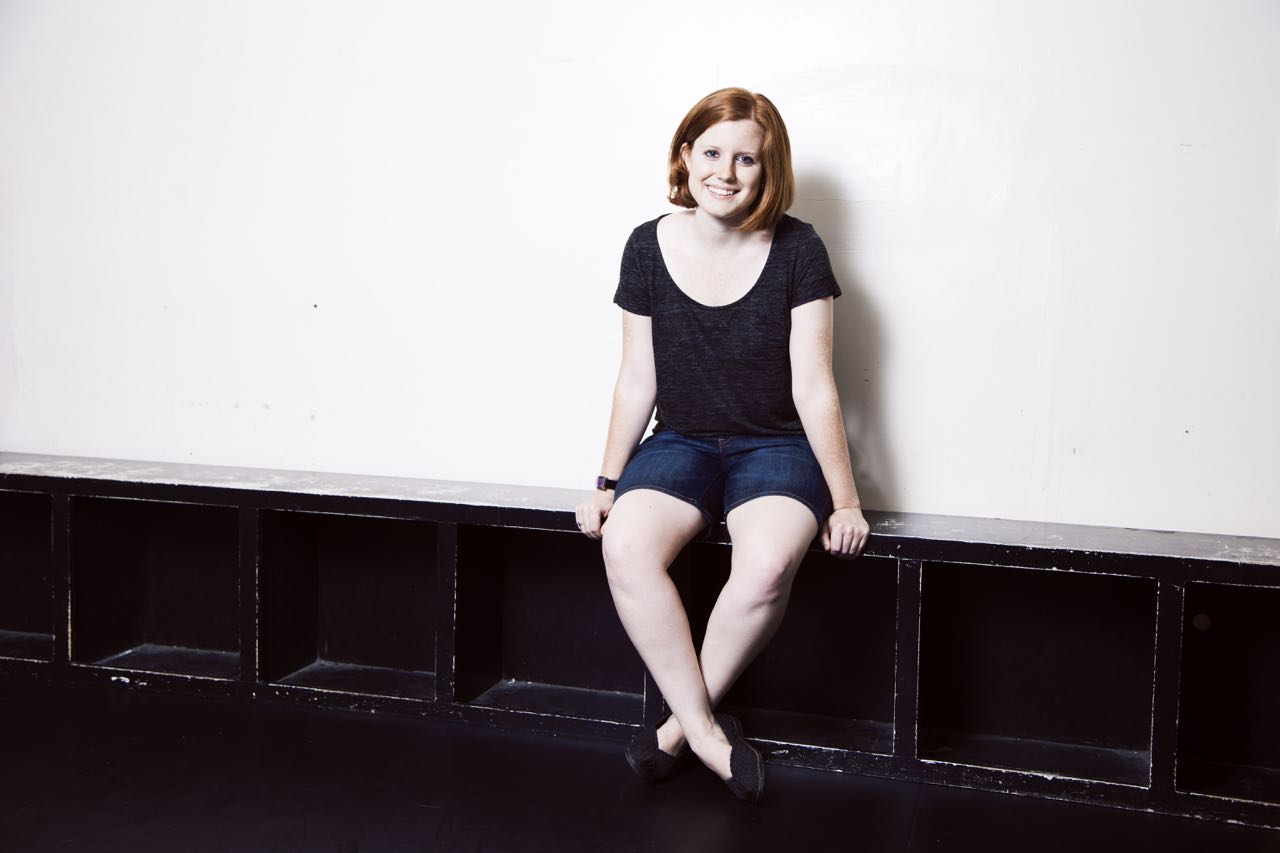
Photography by Sofia Colvin
“On September 5th, 2011, a boy appeared in Berlin claiming to have lived in the forest with his father for the past five years. He had no memory of his past – only that his name was Ray and he travelled to Berlin following the death of his father in the woods. What followed were nine months of speculation, police inquiry, and a global media frenzy, as the mystery of the Forest Boy slowly unraveled. Based on an incredible true story, ‘Forest Boy’ is a modern-day fairytale of growing up and, above all, imagination.”
Music by Claire McKenzie. Performances July 27th, 28th, 29th, 30th, and August 2nd. For more info, click here.
What are you hoping audiences take away from the show?
I hope that they won’t have seen anything quite like Forest Boy and hopefully won’t have heard music quite like this either. I try to be original when I write music and I can’t wait to show that to an audience and hopefully surprise them.
What about this development process have you found the most useful or the most interesting?
We’re still developing at the moment and it’s ever-changing in the rehearsal room, but I love responding to that. We’ve got an amazing cast and they’re a level up from what we’re used to working with, so it’s just wonderful to get their feedback on the script and the score. I’m working with a wonderful musical director who’s helping me orchestrate the work, so it’s going to be a completely different experience and I can’t wait until a couple of weeks’ time when it finally gets premiered.
What’s something you think can be done to improve the development of new work?
I think the workshop process is the most important time for a new musical because there are so many elements that need to come together: script, score, movement, story. I think the only way you can get that right is with other people, so I believe that sitting in your room, trying to come up with the perfect musical, is near impossible. I think you need to share your work in order to make it better.
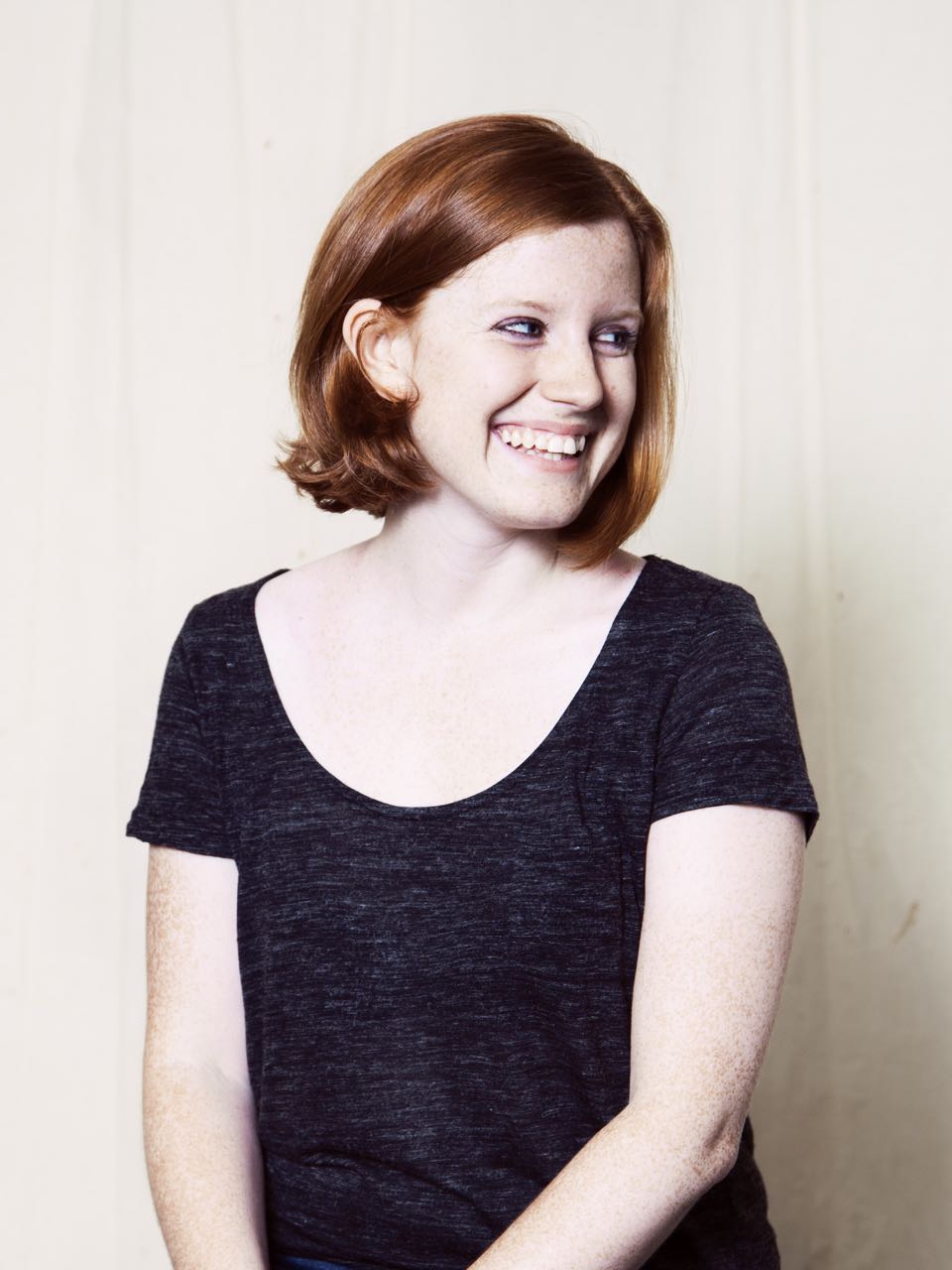
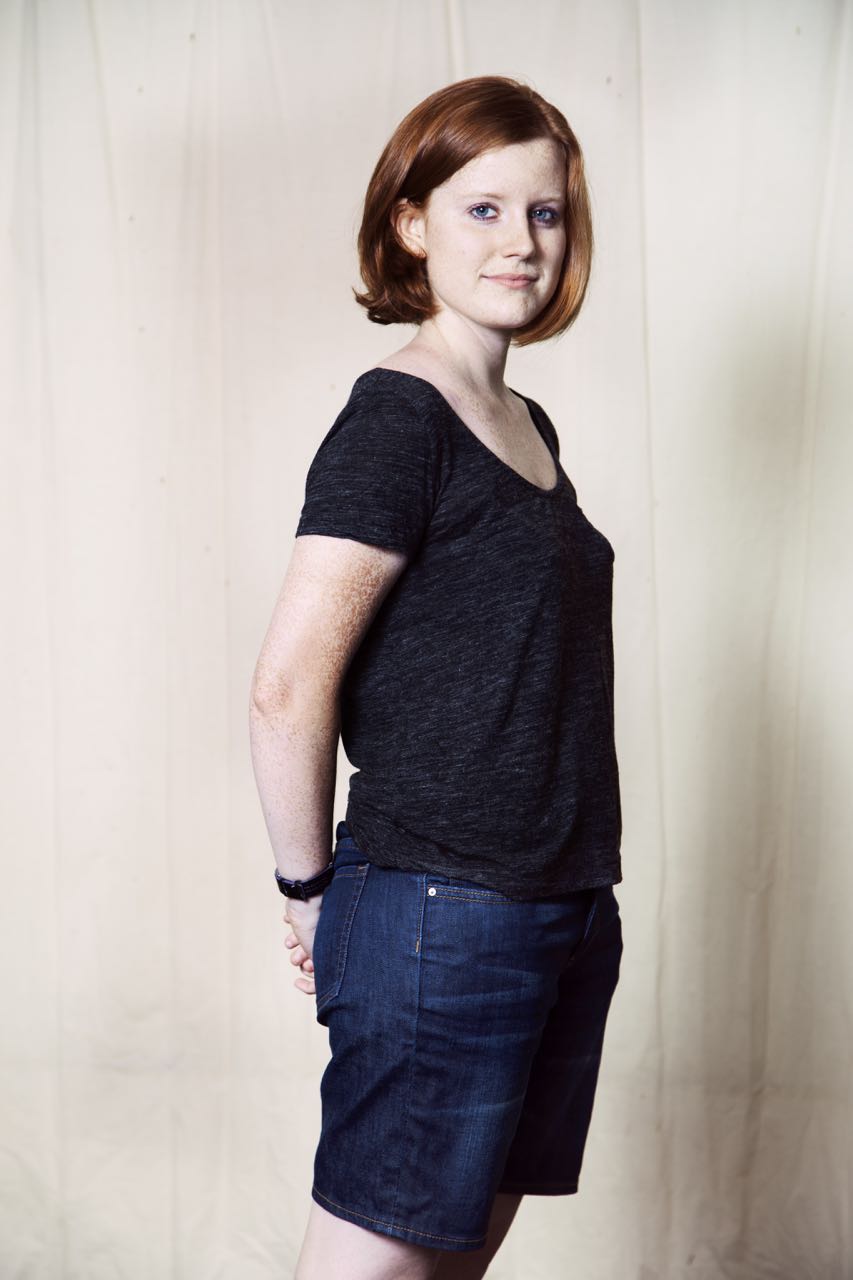
What’s something you think can be done to get different audiences to engage with theatre or get audiences to engage differently?
It’s interesting because if you’re looking at musicals, musicals are not a big art form in Scotland, where I’m from. They are in London, but in Scotland it’s mostly plays, so I think I’m really keen to change that and to get more audiences in Scotland appreciating the musical. When I come over here, the musical is probably the top art form and so respected, and I think it deserves that respect back in Scotland, and I’m keen to change that if possible. In terms of audiences here, for us actually getting the audiences in to see Forest Boy is just such a learning experience for us, to see if our work will [resonate?] with an American audience.
Beyond being located in America, what does the term “American Theatre” mean to you?
It’s quite a different world over here in terms of the theatre being made, it’s kind of bigger and bolder and I love that. I think UK could learn a lot from the model of making new work over here. It’s quite hard to get new work up and running in the UK, whereas here there seems to be a process of developing new musicals, that can progress and allow them to get bigger and bigger quite easily with the support; there’s a bigger network here. I think it’s exciting to be here and learn that process of getting a show from small rehearsal workshop level, to the big Broadway machine. The American musical is such a tradition here, that we don’t necessarily have in the UK. We are learning every day, we’re like, “Oh, right, that’s how that works, that’s how you would get a producer.” It’s just so different. I work for rep and regional theatres in Scotland and that infrastructure’s in place, so you get employed by a theatre to make music, whereas here, it’s very much make everything and sell it.
Lena Gabrielle and Rachel Klein of Tink!
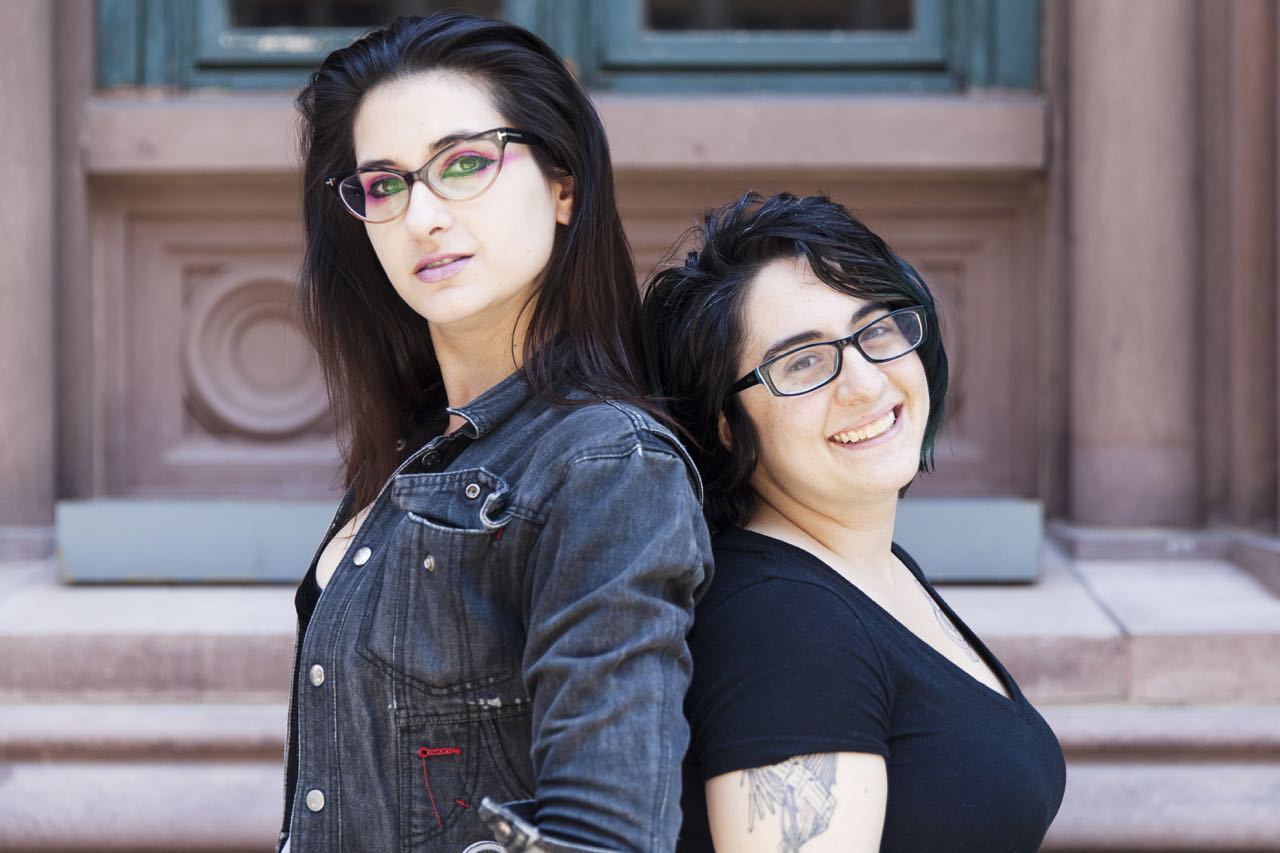
Photography by Jessica Nash
“In a time before time was important, there was an island full of music and magic, where pirates, natives, fairies and other mysterious folk lived, loved and fought together- until one young fairy and one young pirate crossed paths. When first mate James of the Jolly Roger meets the yearning, idealistic young fairy Tinkerbell, their star-crossed romance brings together the entire population of Neverland, from the mischievous Dream Weaver fairies to the mighty Natives, and even a colony of scavenging boys whose leader fell from the sky.”
Music and Lyrics by Lena Gabrielle and Directed by Rachel Klein. Performances July 25th, 28th, 30th, and 31st. For more information, click here.
[Danielle Feder, who is the dramaturg for this production, is a staff member of The Interval.]
What are you hoping audiences take away from the show?
Rachel: I think that the show is incredibly entertaining but it also has a lot of heart. I hope that the audiences take away Tink’s story, the female power that the show presents, and the life lessons about love and friendship and prioritizing.
Lena: I hope that everybody takes away something different from the show. I didn’t come up with the concept, and then through the process of writing it, it became very personal to me. The people who I’ve spoken to that were lucky enough see the original production were like, “I could really relate to it,” even though we’re completely different people. So I think that it’s relatable to everybody and I hope that everybody can just find their personal connection to the story.
What about this development process have you found the most useful or the most interesting?
Rachel: For me, I saw the footage of the original production and then chatted with the creative team and found out there were 100 people in the original production. So scaling it down to 19, which is already huge for New York—huge for NYMF—it was a welcome challenge to figure out how to double cast those roles, how to create a world that seems as large as the writers originally intended, but is smaller and more compact.
Lena: I’ve done a lot of shows, and they’ve all been like one shot—shows done in three days. So getting to go back and rework things that I wanted to change, or didn’t realize that I wanted to change, and then speaking with all these awesome people who are on our team. Just getting to move in a forward direction with the show, I have never had that experience. It has been super awesome and I’m still making changes.
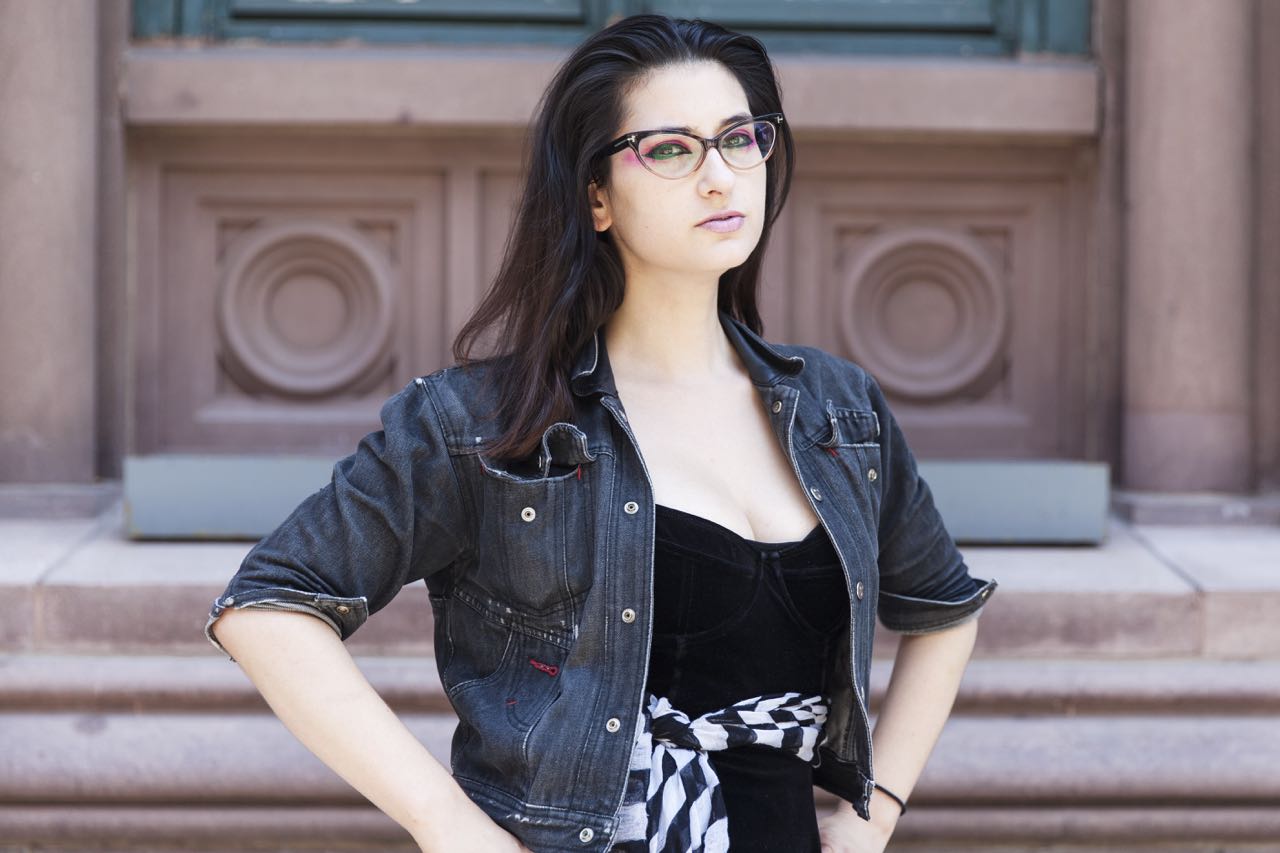
What’s something you think can be done to improve the development of new work?
Rachel: I’m sure every director in the world will tell you the time constraints on the contracts. I understand that the contractual conditions are set in place 100% to protect the actors and the team, which is fabulous. What we are experiencing now, for example, is you don’t know the certain cuts in streamlining [the piece] that need to happen until the entire piece is already up on its feet. It’s harder to develop in pre-production, to get certain things streamlined, and to know what certain moments are, until you see the entire piece as a whole. And then from there you’re almost out of time. So that would be such a luxury to have more time with developing. If the show moves forward, which we have some top-secret intel that there’s a large possibility that it will, then we have the opportunity again to revisit this and explore and continue making tweaks here and there to make the piece stronger. Broadway musicals sometimes take ten years to create and there’s a reason for that. There are so many moving parts in musical theatre. It’s not just the story, it’s also the music, the lyrics, the choreography, the characterization. There’s a lot of moving parts.
Lena: I think that people can be more blunt sometimes. In musicals that I’ve worked on people take things personally, and I think it’s important to not take these personally, to move forward, because everybody’s on the side of the piece. That hasn’t been too big of an issue in this show, but I’ve worked on some shows where it’s like, “I heard that you said that you didn’t like the thing,” and I think that sugar coating is overrated. I think that one of my biggest struggles in new works is that because we are under such time constraints, people just try to sugar coat everything so nobody feels bad, and I think that actors and creators should learn that everybody’s on the same side and that nobody should feel bad because nothing is ever against you.
Rachel: To piggyback off that, I’m going to say it’s all about killing your darlings. We’ve all had to make sacrifices. I’ve had to cut production numbers, Lena’s had to cut music, and Tony [Marino, the librettist] has had to cut chunks of the book. We’ve all made sacrifices for the greater good of the show, and it’s not personal against anybody’s work because we all have an understanding that we’re working incredibly hard, and we all respect each other and what we’re doing. The piece is the thing and it’s not any of our individual moments that we’ve created.
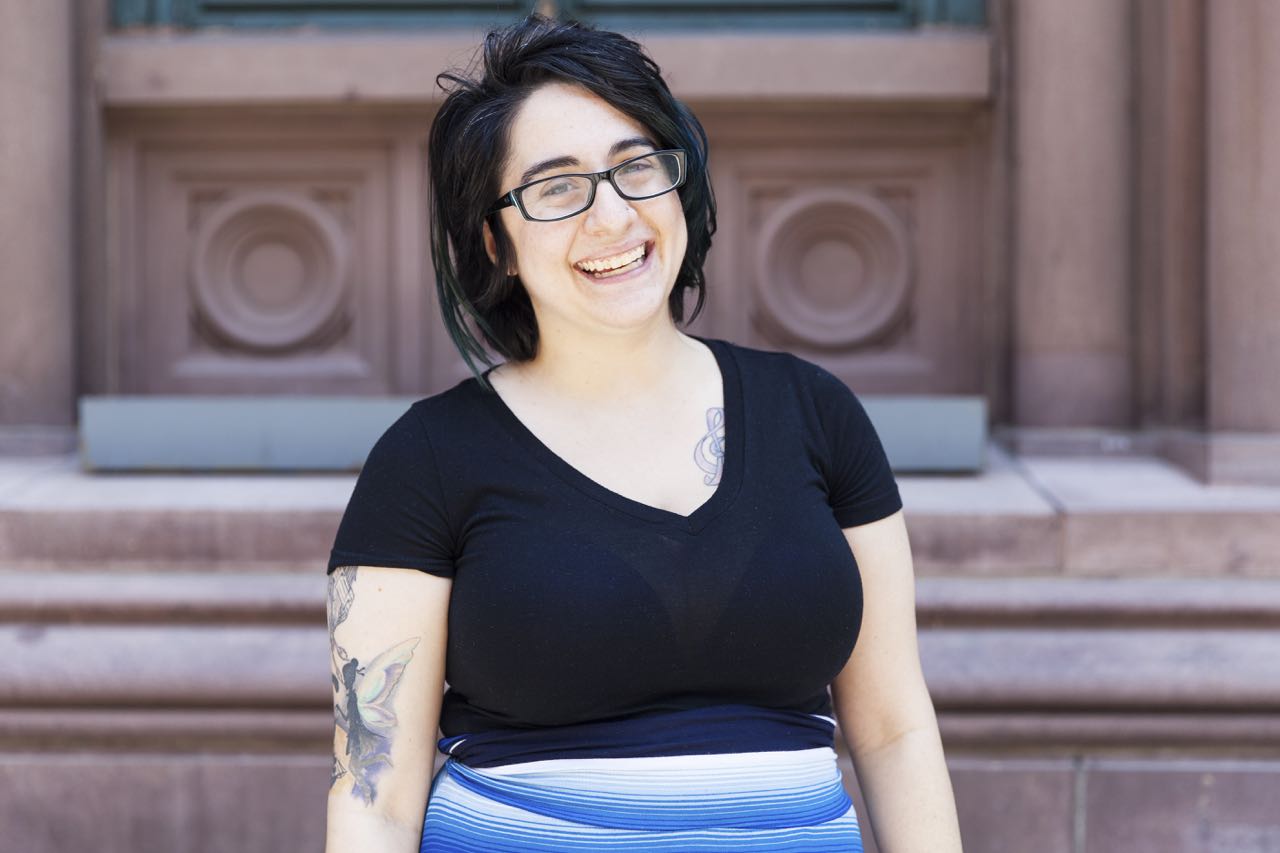
What’s something you think can be done to get different audiences to engage with theatre or get audiences to engage differently?
Lena: One of the reasons I’m so excited about this piece is because I don’t think that there’s a ton of new family theatre being created. That’s why I think that this piece is really special. I know there’s a couple of other ones at NYMF that are family friendly, which I’m so excited about. I have this Tinkerbell tattoo and I’ve run into people on the street and they’re like, “Oh my God, I love your tattoo,” and I’m like “Oh yeah, I wrote a show about it,” and they’re like “Wait, what? A Tinkerbell musical?” Just stuff like that. I think that there’s value in—not going back to old, traditional theatre necessarily—but I think that the best way to engage new audiences, and especially young people who are going to grow up with theatre is to make it accessible to all and not like, “This is a children’s theatre piece,” but to make it so that parents want to see it and parents want to take their kids. I know that a lot of people will see this show, whereas some of my friends who aren’t as into theatre haven’t seen other pieces because I’m like, “Well it’s probably not up your alley,” because it’s like super trippy. There’s merit in that, but I think in terms of engaging new people, just going back to taking something that people already really like and developing it and not trying too hard to be something that it isn’t or doesn’t need to be.
Rachel: I completely agree with Lena on that. Also, the world has changed because of movies. If you watch a film of a musical that’s contemporary there is editing in all of the choreography, but if you look at something from the Golden Age of musical movies you see things are in a long shot. Even look at music videos from the early ’90’s. If you look at Rhythm Nation, Janet Jackson’s video, which is one of my favorite videos of all time, they trust the material and there’s long shots of what’s happening. When you look at anything now, it doesn’t matter what’s happening, the edit is 2 seconds. I know that is a different medium than theatre, but we have to look at the way people view everything and apply that to how we perceive theatre. Things have to keep moving, things have to feel engaging, otherwise you’re going to lose your audience. I know so many people that lost a potential interest in theatre at a young age from seeing Death of a Salesman with pacing problems at their local community theatre. If that show’s done right it’s an extraordinary play, but if it’s done slow and long it just becomes tedious. To keep things moving quickly, to keep things fresh, to keep things, at least, allegorical for the world we live in today so that they’re relatable to people, is definitely a way to continue to engaging new audiences.
Beyond being located in America, what does the term “American Theatre” mean to you?
Rachel: It’s interesting, because there is theatre in America and then there’s theatre in New York. In New York you have theatre in Midtown and then you have theatre Downtown, so there’s so many different categories of theatre. When I think of Midtown I think of commercial, giant musicals that will eventually go on tour to the rest of America. When I think of Downtown New York, I think more of avant-garde. That being said, there is work that is well-known, there’s classic American theatre being done Downtown as well, and there is sometimes more avant-garde stuff being done in Midtown. Having seen a lot of European theatre specifically, and some Asian theatre, I think in Western Europe there is a lot more movement-oriented theatre that is still story-driven. Whereas in New York, I found when I was running a movement-based theatre company, in America they don’t know what to call it. They call it dance and that’s how I began getting labeled as a choreographer when I’ve always viewed myself as a director. They were plays, but they were plays without words, but they were all about the story communication in physical medium, so that’s something that is specifically not in American theatre. People contextualize theatre based on something that has a script that’s being told, which is something that the rest of the world doesn’t necessarily need to have. It sort of categorizes theatre.
Lena: I haven’t been overseas. I’m actually going to London for the first time in the fall. I’m just thinking that people think that Broadway is the thing, and it is, but at the same time what I love about, especially developing this show at this little community theatre in Pittsburgh, is if you wanted to do it, you can develop new theatre. You can do it anywhere, and I think that that’s really great. Me moving back to New York from Pittsburgh had nothing to do with the show. I got another job and came back here, but I could’ve been really happy doing theatre in Pittsburgh and developing new theatre in Pittsburgh. I think it’s just really important to remember that if you have the passion to do it, that you can do it, and you don’t have to be going to Broadway. That’s the accessibility of theatre. That’s one of the great things about Tink—you can do it places and it’s not a show that you need lots of stuff [technology, space, money] to do, and I think that’s something that’s really great.
Kate Ferber and Adrienne Campbell-Holt of One Child Born: The Music of Laura Nyro
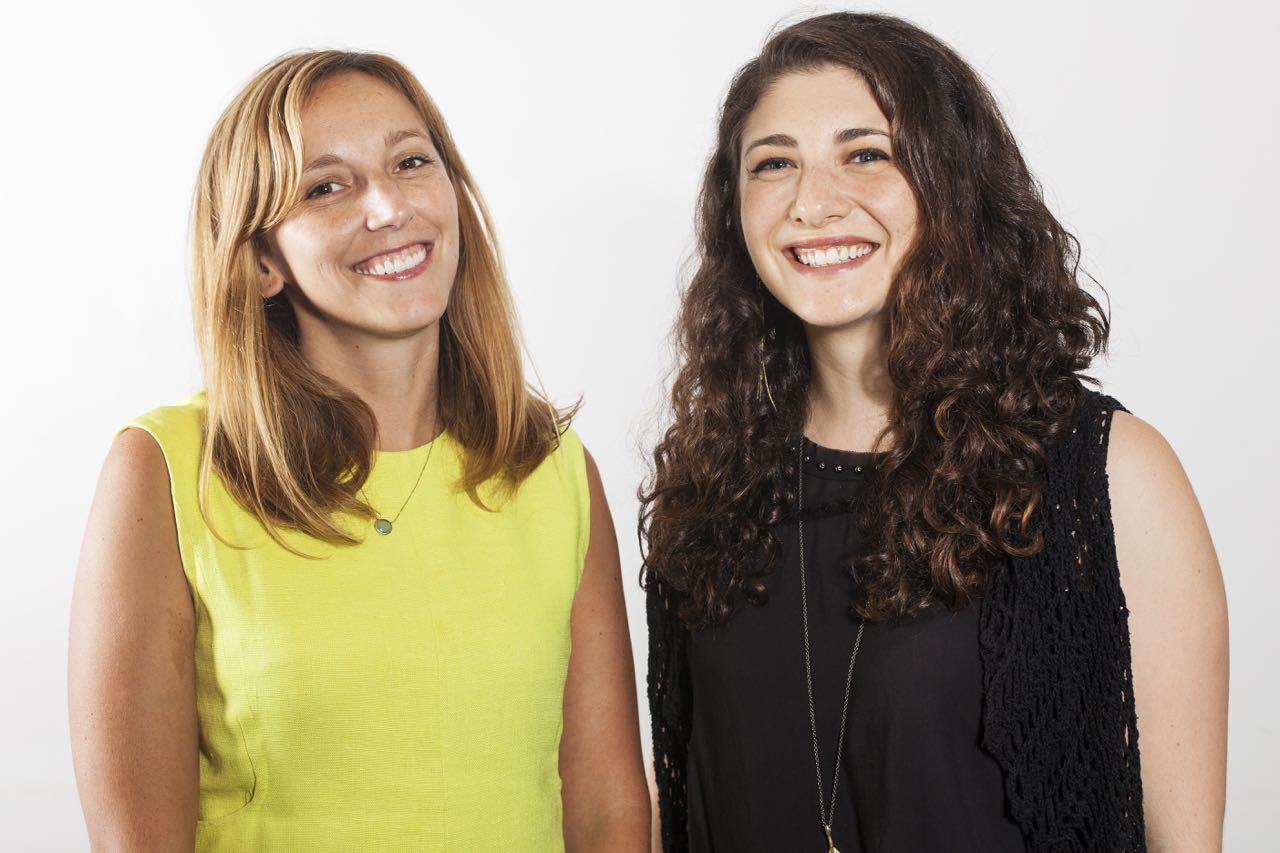
Photography by Jessica Nash
“This acclaimed one-woman show, featuring Kate Ferber, celebrates the music and creative force of the late singer-songwriter and Rock and Roll Hall-of-Famer whose pop masterpieces—including “Eli’s Comin’,” “And When I Die,” “Save the Country,” and “Stoney End”—topped the charts in the ‘60s and ‘70s.”
Performed and Co-Written by Kate Ferber and Directed by Adrienne Campbell Holt. Performances July 20th and July 21st. For more information, click here.
What are you hoping audiences take away from the show?
Kate: I would hope that people renew their interest in the history of music. That they are inspired, that they dive back into the music that they loved as kids. Listen to it and maybe buy a physical record, like an LP of it, and get a record player, and listen to music through really good speakers and not through their phone speakers. I hope that they remember how much they have been changed by the music that they love, and most importantly, that they either are reminded of the genius of Laura Nyro or educated about it.
Adrienne: I feel like this show is extremely important right now, because we are in a dark place as a society, and every day there’s news of more horrible atrocities. I think Laura really embodies so much hope and connection and love for all, and coming at relationships—whether it’s mother-child, romantic relationships, friendships. There’s so much rich depth in her songs and in the characters that Kate portrays in this piece that really span different cultural time and place, different ethnicities. It really sort of makes me feel excited and hopeful about what we’re capable of as human beings, instead of discouraged about when I read the news.
What about this development process have you found the most useful or the most interesting?
Kate: The development hasn’t just been, we had an idea and brought it to NYMF. This has been happening since I was a young girl, when my mom was putting on Laura Nyro on the stereo. The seed of this is as old as me. We started the first draft when I was 19 years old, and that was 12 years ago. It was always a one-woman show, it always had the music of Laura Nyro, and over the course of several years as my co-writer Louis Greenstein and I, and Adrienne and I, have done other work, we have come together throughout the years to develop the show into what it is now. It’s turned from what used to be a biopic, where it’s like, “I am portraying Laura Nyro as a character. I’m telling her life story as such.” It started as that and we realized that it’s not as interesting as when true, die-hard Laura Nyro fans come up to me and tell me how obsessed they are about Laura Nyro and why. This has happened throughout the course of my life every time I play a Laura Nyro cover, these people come up to me and their fervor and drama in the monologue is so intense that that’s what we decided to put in our show. All different kinds of people from all over the country, and she has fans all over the world. They have these really intense stories about how she changed their lives, and that’s what we put in the show.
Adrienne: In a sort of special twist, the first time we performed the show when I got involved, which was in 2009, was at the Laurie Beechman Theatre. We’re going back, and it was in the summer of 2009, so seven years later. It’s pretty cool. The show has evolved so much. Most recently, we had a run at Oberon at A.R.T., and that was our first sort of sit-down engagement, and the work that Kate could do as a performer, just living in that and having audiences night after night, just be so excited and also probably accumulating more stories that may be in the future production.
Kate: We’d love to have a real life for this show. Doing a one-person show is, in general, a terrible idea, and I wouldn’t recommend it to anybody, but if you’re going to do it, you’ve got to have a really good reason. I wouldn’t be doing this unless I thought that it was a truly worthy piece. I really do believe that these songs need to be celebrated and need to be heard. What we’d love to work on is a tour. I’d love to take this to as many cities around the country and around the world [as possible].
Adrienne: The show has grown so much, Kate and I have both grown as artists since we started working on the show, and I think to return to New York with the show in a much stronger place than the last time it was produced here—I think the last performance was at Joe’s Pub a few years ago. We feel excited to launch into more productions in New York, and a tour. It’s very affordable for the producers.
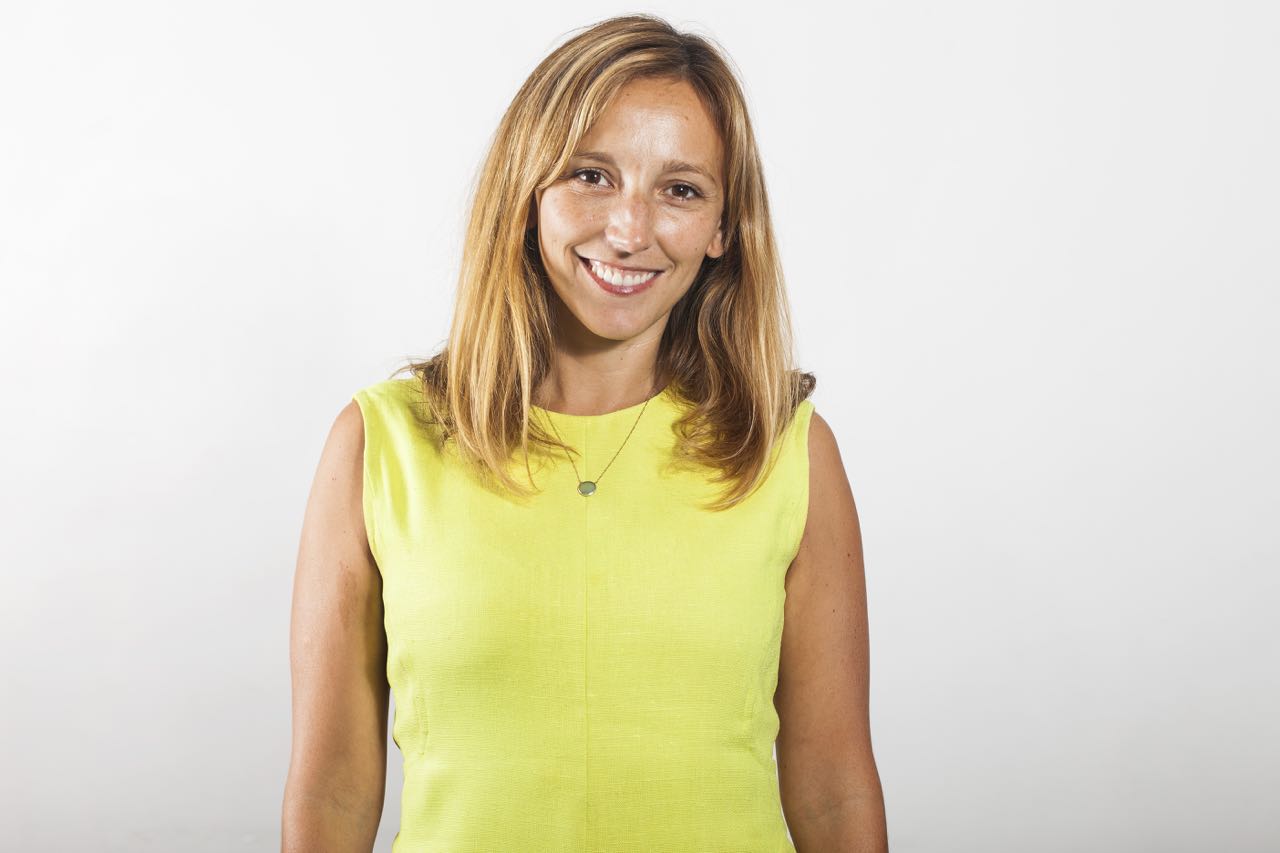
What’s something you think can be done to improve the development of new work?
Kate: I would first and foremost say education, in terms of the work-makers themselves. Really providing theatre students at universities with an understanding of the history of musical theatre, and encouraging people to get into the stream instead of trying to reinvent the wheel. Just coming at it from that philosophical point of view, it’s like, “I’m up-and-coming as a new artist. Yes, I’m trying to change and save the world, but the same time, I need to understand that I’m participating in a culture that already has something going.” So it’s like, “What can I add to the wave and how can I make the wave of positivity stronger?” I also believe that fundraising is so important when you’re developing work. If you really pay people for the work that they’re bringing to the table, the difference in the investment of the creative team is going to be intense. I have a lot of opinions with how our industry is going, but I really think that education and resources—”What has come before me, and how can I participate, and how can I make a living participating?”—will really just foster faster growth in musical theatre.
Adrienne: I want to give a shout-out to Rachel Sussman. I think that as the new leader of NYMF, she’s going to be tremendous for the vitality of musical theatre, and it’s been so exciting to see the range of super experienced, talented, familiar Broadway names, like Victoria Clark directing a show in NYMF, with very emerging book writers, composers, directors. Festivals like NYMF that are known and well-attended by both industry and the public are so important. There should be more exciting, emerging directors that are directing on Broadway, but that’s not going to happen until this sort of community gets to know them, and so that’s going to happen in places like NYMF. I feel so excited about this year—this year’s NYMF roster is so cool. I feel like Rachel’s going to change the world.
What’s something you think can be done to get different audiences to engage with theatre or get audiences to engage differently?
Adrienne: I think that marketing and casting and copy-editing language, I think that it all needs to be much more inclusive. I feel like often casting notices, marketing copy, and graphics are really aimed at the traditional musical theatre lover, and not really inclusive of people who don’t know that they like musical theatre, or don’t really know what musical theatre is about. Also, just having more voices contributing to the work.
Kate: Yeah, I really agree with that. I went to Broadway Sessions and played a couple songs, and I did one of the press events, and there were a lot of the NYMF shows performing a couple selections, and yes, it’s under the guise of musical theatre, but there are a lot of people writing pop songs. People who like pop music might like this, and they might not know, so I really get behind what Adrienne said.
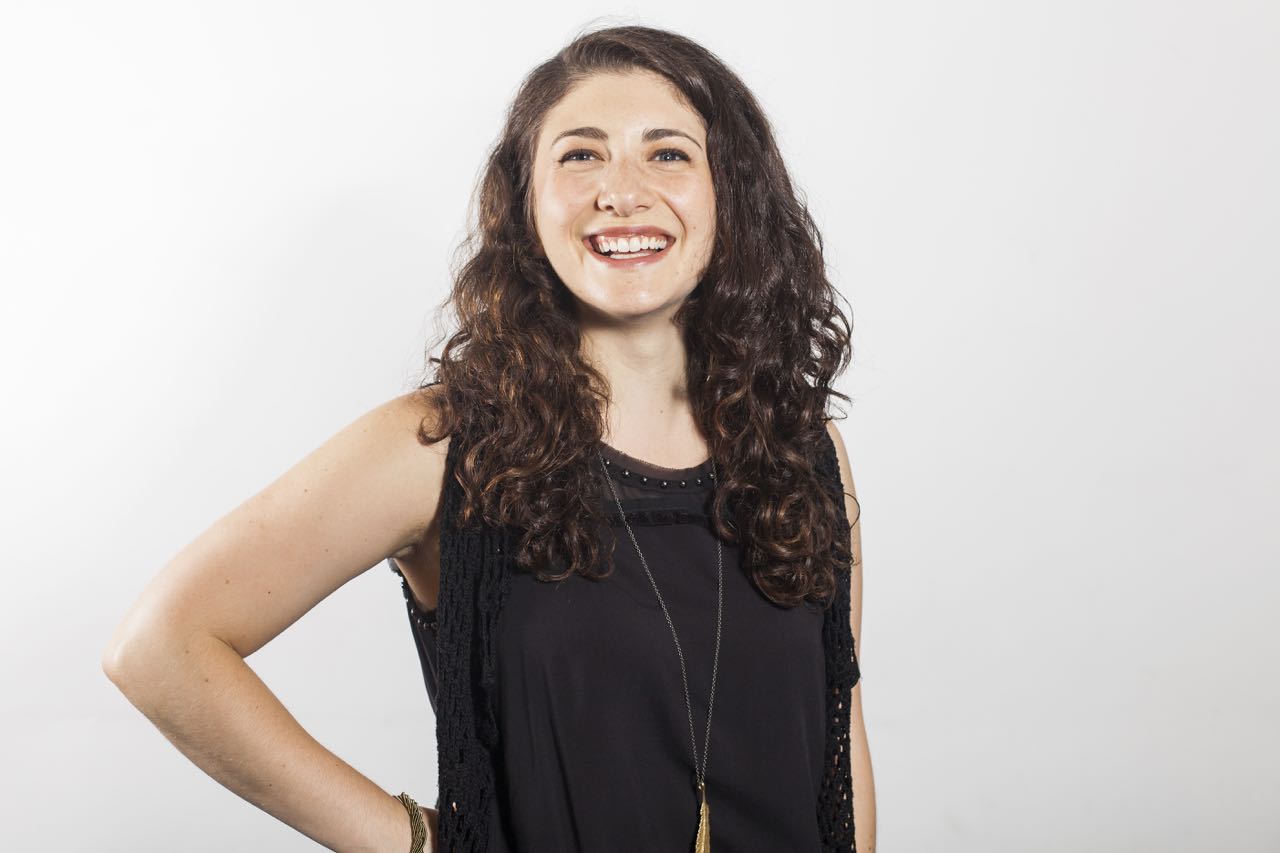
Beyond being located in America, what does the term “American theatre” mean to you?
Kate: American theatre is a conversation. Theatre is starting to mirror so many other cultural phenomenons in America, which is like, “What is audience and what is performer, anyway? What is audience and what is artist?” Especially with social media. I’m coming from the music world especially, and people just will be in their bedrooms and press record and play a song, and three million people will see it. That person, just a moment ago, was an audience member watching somebody else play and sing a song. This idea of community art-making, I really believe that we’re moving toward that, or back to that. One thing I learned at NYU is that it all used to be one thing. It was just a circle around the fire, and it was this tribe, and everybody was singing and dancing and watching and doing it all, and they were telling the story, the history, the oral history of the culture. I feel like we’re coming back to that, and NYMF is part of that. I’m hoping that the American theatre is moving in the direction of more and more collaboration.
Adrienne: I keep thinking about my nephew who’s eight, who is obsessed with math, and how he talks about infinity a lot, and googolplexes, and what googolplexes are, and that’s like a googol with infinite zeroes. The exciting thing about America is we are so rich, and we have so many cultures, and we have so many ways of life, and so many ways of telling stories, and song, and making music, and so I hope that American theatre moves towards reflecting the massive diversity of this country.
Aya Aziz of Eh Dah? – Questions for My Father
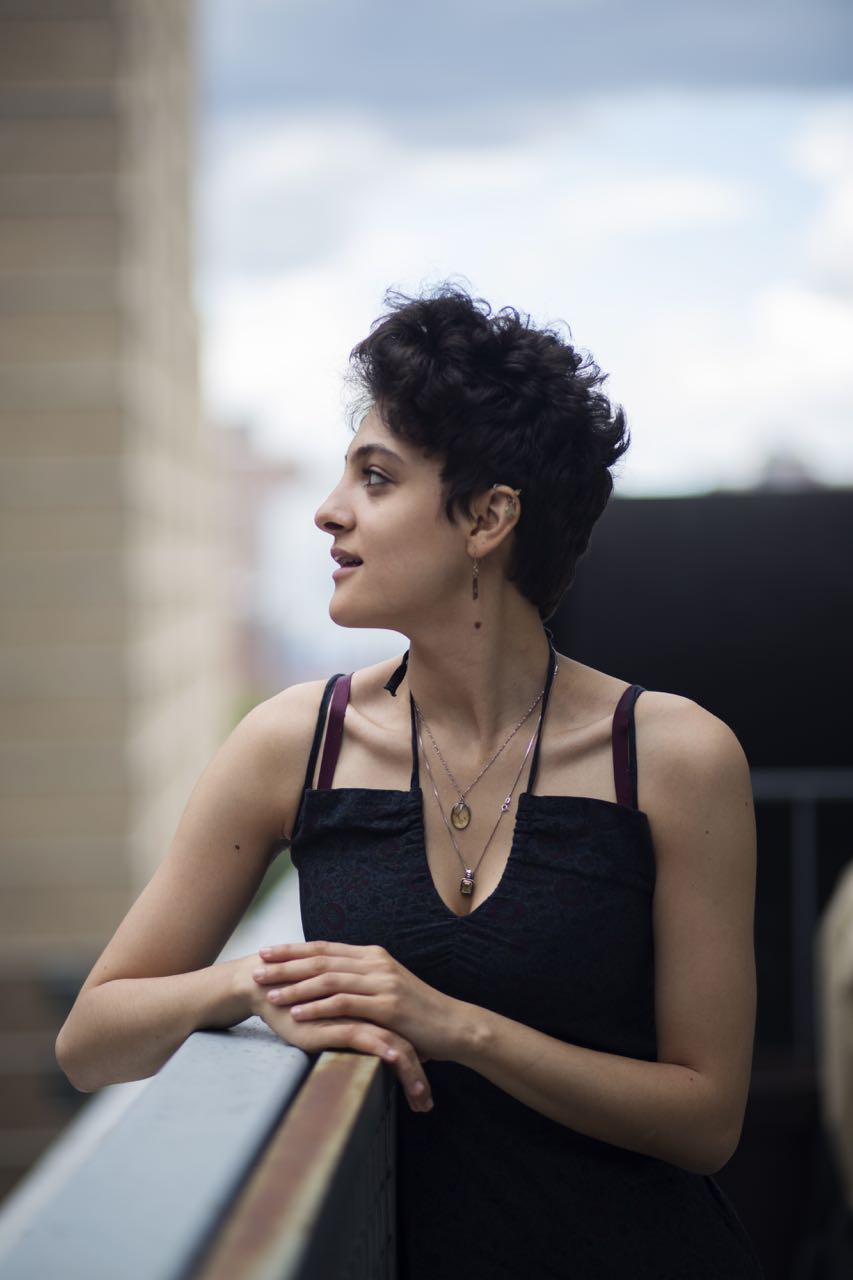
Photography by Tess Mayer
“’Ghetto-Hippie-Arab-Commie-China Doll’ Aya was shaped by the eclectic community of New York City. But Aya’s father, an Egyptian-American world-traveler, remained a mystery, as did her Muslim family. In this solo musical, Aya enacts the world she came from and the family she went in search of. With a range of accents, voices, and zany characters, Aya’s story deals with contemporary conflicts—identity, the culture war, Islamophobia, all while asking Eh Dah—what is this?!”
Book, Music, Lyrics, and Starring Aya Aziz. Performaces July 19th, 20th, 23rd, 24th, 25th, and 28th. For more info, click here.
What are you hoping audiences take away from the show?
One, I think I want people to have a good time. Two, I think I want people to see themselves in a story or a person or an experience that might be unfamiliar to them. The common humanity in people who we might not think we have anything in common with. I’d love people to feel simpatico or like these characters are accessible and speak to parts of them, their own awkward humanness that we all share. Ultimately, I’d love people to have a good time.
What about this development process have you found the most useful or the most interesting?
Meeting Corinne [Proctor], the director, and working with the editing process of this. The show has been completely re-written. Arpita [Mukherjee, producer] found me at Fringe and I was a little reticent at first to go on with the piece because there was so much I wanted to re-work. This has been very much a devising. Devising has been as much a part of this production process as putting it on its feet, and that’s been really helpful.
What’s something you think can be done to improve the development of new work?
I think NYMF is such a resource. All of these spaces in which people can come and hear each other’s work and devise through the inspiration of hearing each other. We’ve had a couple of open mic-type nights and workshop nights where people have come and brought new work, and bounced ideas off of each other and networked, and those spaces are so important and often inaccessible due to how expensive and difficult it is to have access to those spaces. I think ultimately, the theatre community should be lobbying for more public funding for these endeavors so that these spaces can be open to artists who might not have the means to bring their work to a space. I’ve been very fortunate to have met Arpita and have my show produced. Otherwise I wouldn’t be here. I think the more we can get funding for the arts the more spaces we’ll have to include and share in each others’ work, which ultimately helps us individually as artists.
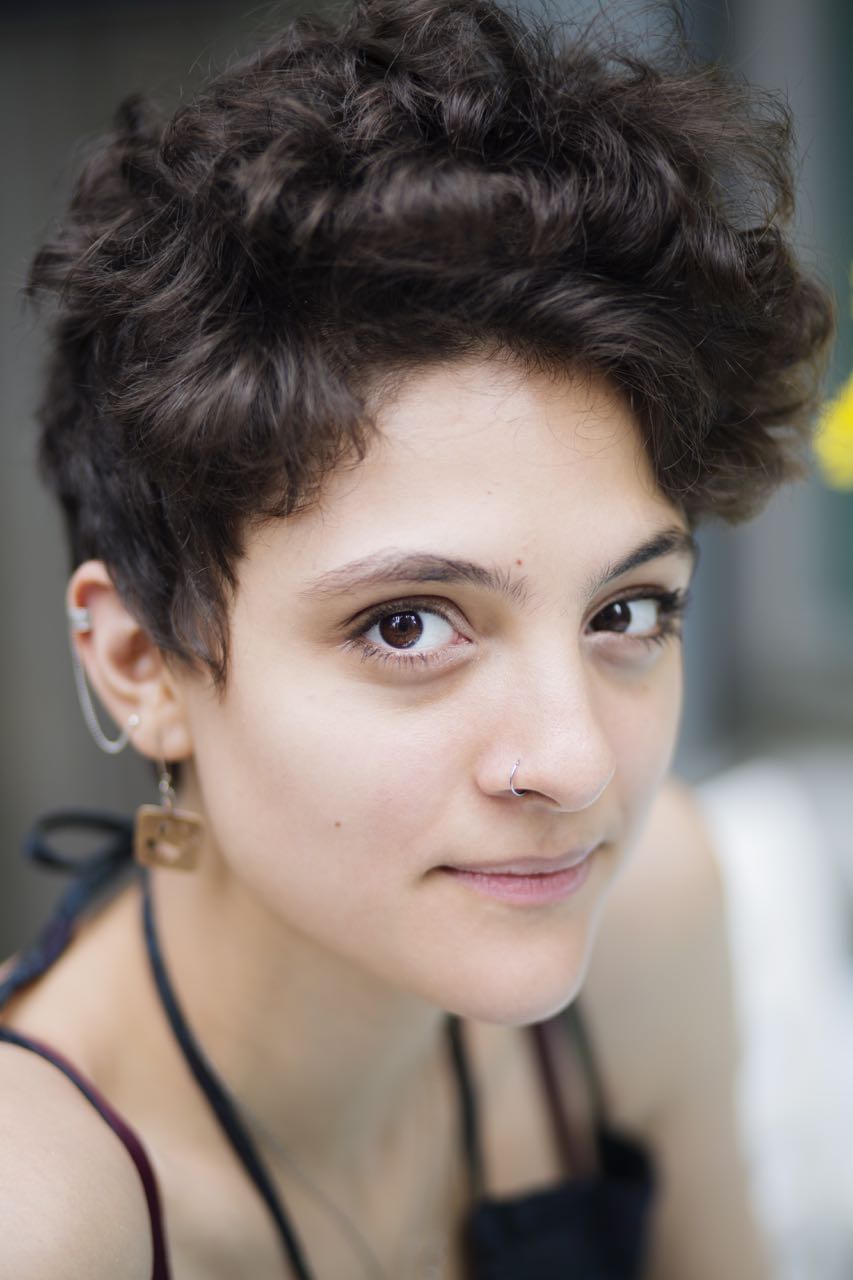
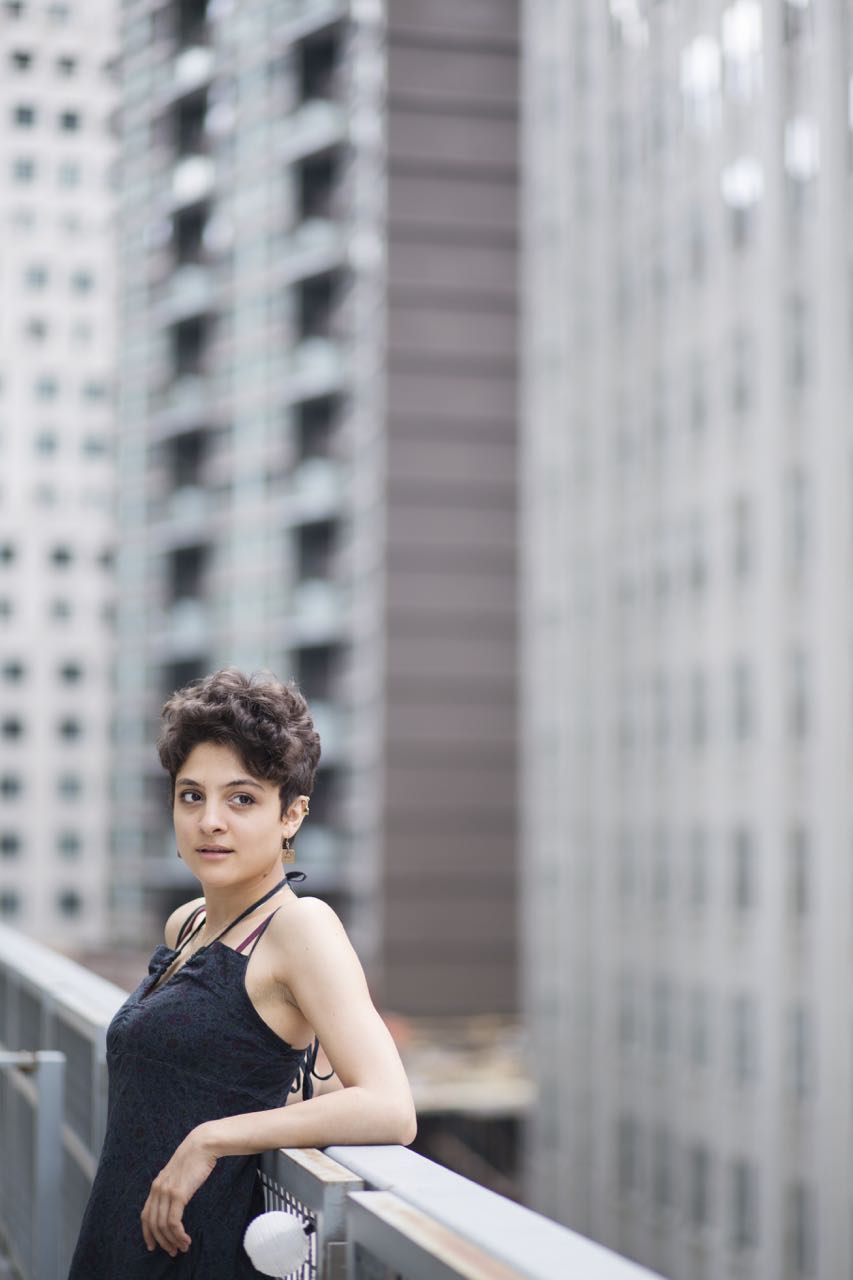
What’s something you think can be done to get different audiences to engage with theatre or get audiences to engage differently?
Definitely bringing art to more outer-borough communities, more working class communities, and communities of color through either publicly sponsored spaces that are accessible to community centers, or investing more in finding ways to reclaim public space. Exploring street theatre is also really important. I have so many friends and know so many people who, were I not in this festival, would not know about it, nor would it be accessible to them. Finding ways to widen the parameters of the mainstream.
Beyond being located in America, what does the term “American Theatre” mean to you?
I guess American theatre is any theatre that comes out of an experience of somebody who identifies as American. That can mean anything, right? This show that I’m working on and devising with Corinne is specifically looking at what is American identity? What does it mean to be of multiple worlds, multiple cultures, and social worlds? Is that encompassed in what we consider American? I think ultimately we’re entering an era where it is and it should be, and there’s no singular American narrative. American theatre also encompasses that multiculturalism that is inherent to the American experience. Though currently it is not reflected in the spaces and productions and art that are accessible to those communities, specifically non-white communities. I think more and more American theatre will be encompassing that larger reality.
Aneesh Sheth of Normativity
Photography by Sofia Colvin
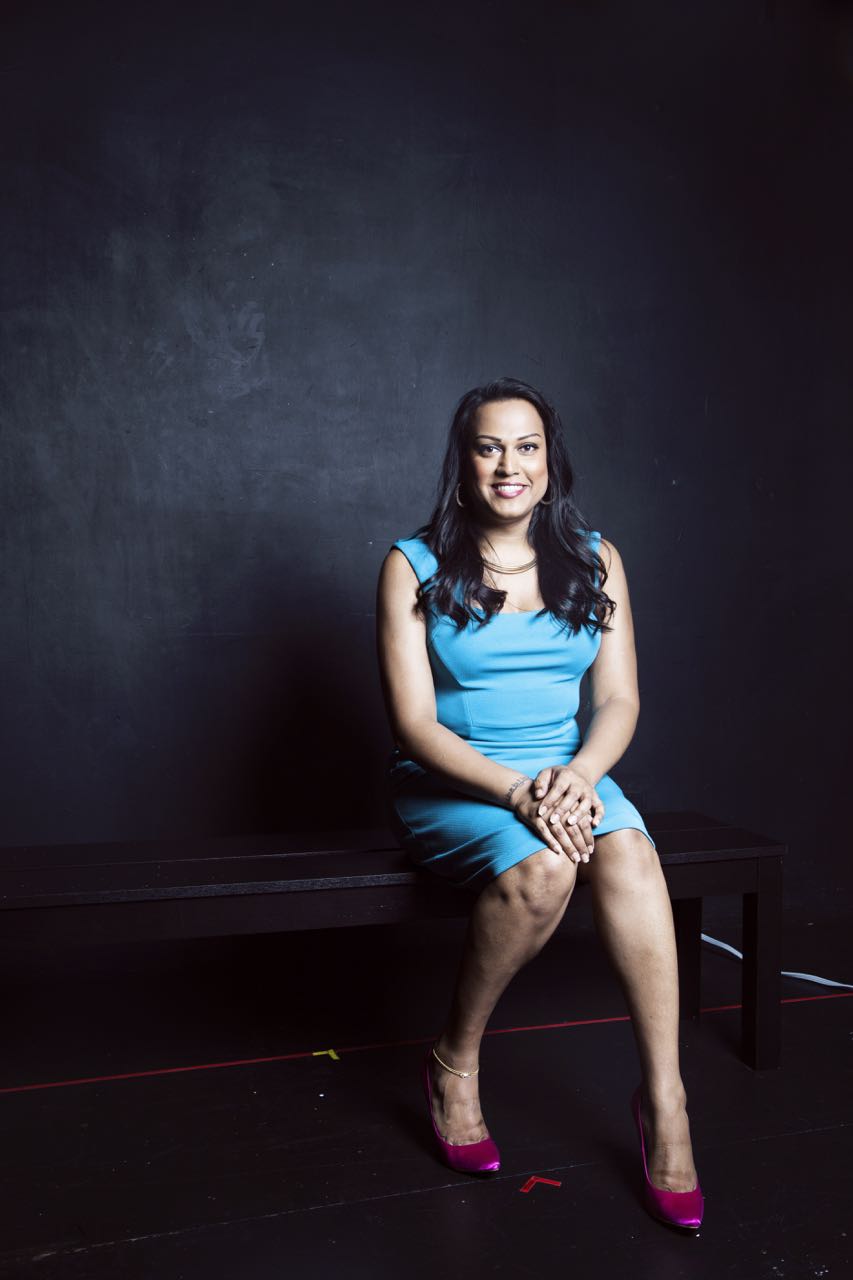
“’Normativity’ tells the story of Taylor, a teenage lesbian, who’s sick of seeing LGBTQ+ people killed off in media with tragic endings (the phenomenon known as ‘Bury Your Gays’). When Taylor meets Emily, a book character who’s willed herself to life in order to confront the author who wrote her story, they force him to rewrite Emily’s story, giving her a happy ending and proving why positive LGBTQ+ storytelling is so important. ‘Normativity’ aims to explore our ideas about sexuality, the world we live in, the people we’re surrounded by, and the way these factors influence the lives of LGBTQ+ teens.”
Aneesh Sheth stars in Normativity. Performances July 18th, 21st, 22nd, 23rd, and 24th. For more information, click here.
What are you hoping audiences take away from the show?
There’s a song in the show called “Normal” that comes towards the end of Act Two. If from just that, that as different as our labels may define us, and oftentimes separate us, we’re also the same. We’re still flesh over bone. I don’t even like the word normal, but we’re all normal. We’re all part of the human race, and I really hope that people take away from the show that the divisiveness that’s particularly rampant in American culture today is something that we should move away from, and try to accept everyone for who they are.
What about this development process have you found the most useful or the most interesting?
Working with this company. It’s the first time in my career that I’ve worked with a company with a variety of people who are of different gender identities, sexual orientations, and who are playing characters who are not based on their gender identities or sexual orientations. There are a lot of people who think that trans characters should only be played by trans actors. For me, I’m an actor first and foremost, and I think true advocacy is having trans people and cisgender people playing a variety of different kinds of roles. Not only roles that are geared to their gender identities. That’s been so fulfilling. I feel like this show is, in that way, a true advocacy, in that we’re all playing roles that are not necessarily based on our gender identities. We weren’t cast solely based on our gender identities, to fulfill a certain character echelon.
What’s something you think can be done to improve the development of new work?
Diversity is a huge concept, in theory. I think it needs to be put into practice. When we talk about diversity, we need to see the majority of work that happens coming from people of different racial backgrounds, different ethnic backgrounds, different gender identity backgrounds. We need to see a lot more work by women, too. More than half of this country is made up of women, and I think we need to see good representation of that on the stage as well. [For actors] Get involved in everything that you can. I feel really lucky to be on the ground floor of a new musical that’s being produced here at NYMF because I think that really opens you up to a wide range of opportunities of different types of more diverse work, and meeting a whole different group of actors that you would normally not meet in more of a commercial setting.
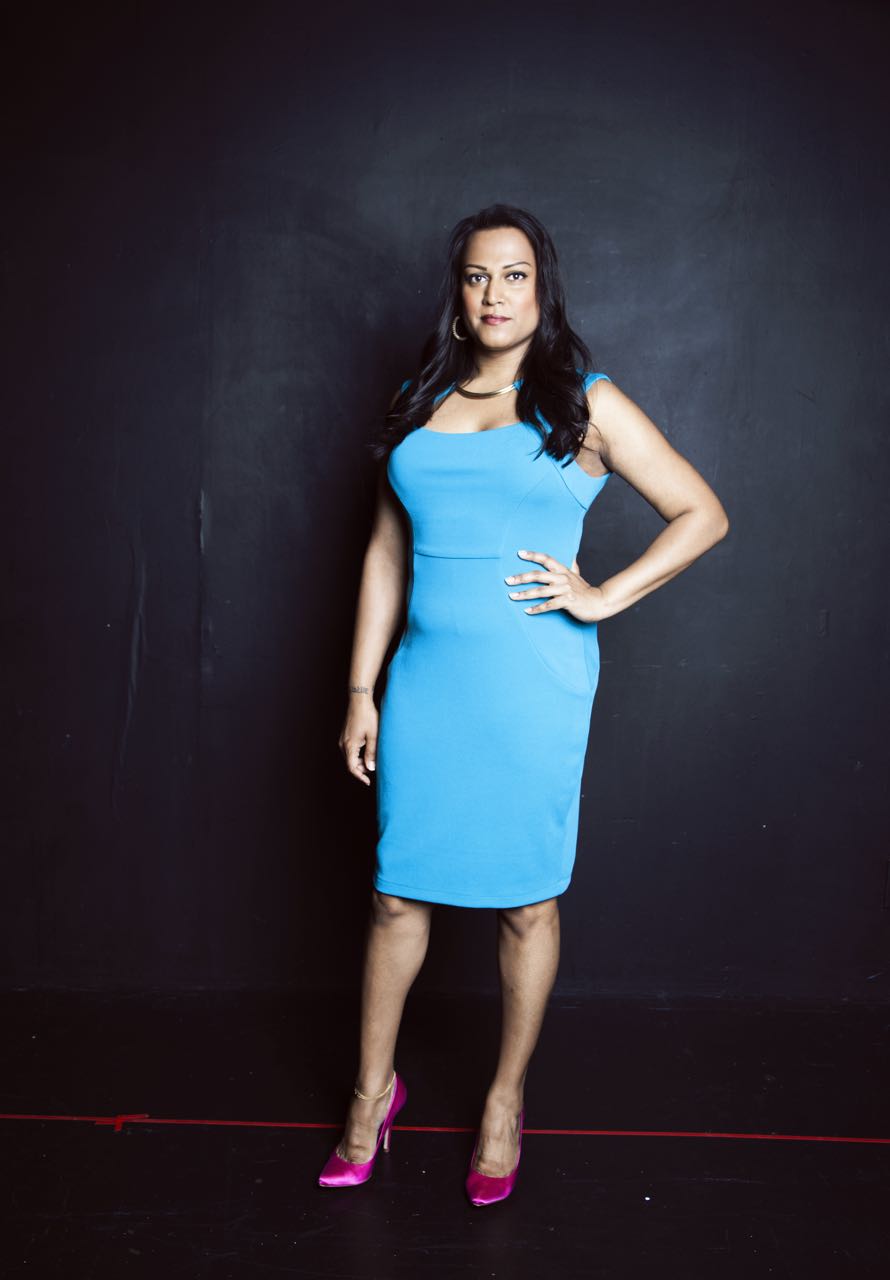
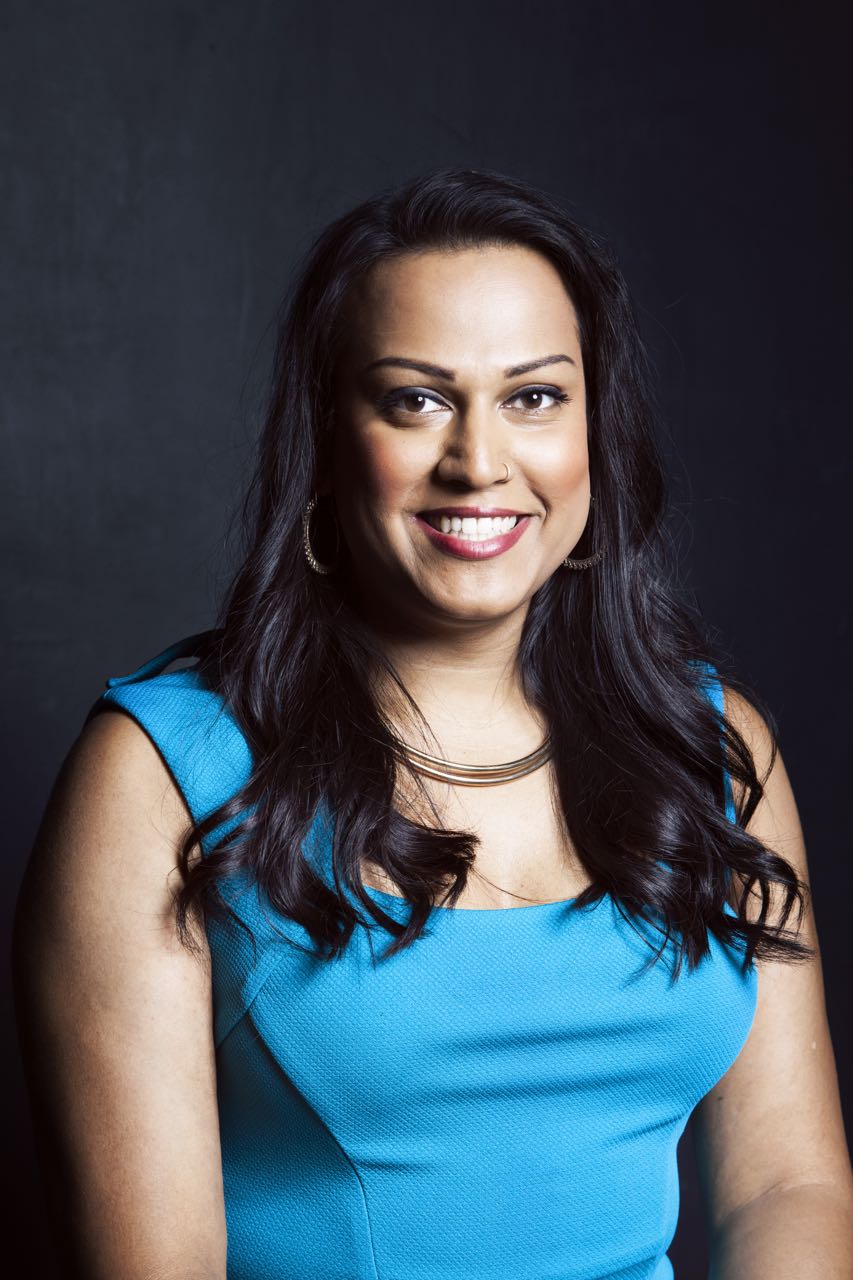
What’s something you think can be done to get different audiences to engage with theatre or get audiences to engage differently?
So much of what we do in this business, and so much of a show’s success, is based on its production value or how much money is put into the show. It’s hard, because a lot of times, the audiences that back those shows or who are paying for those ticket prices aren’t necessarily the more diverse audiences you’d like to see. As sometimes awful as it may be, we almost have to tread a little lightly and sensitively in introducing new topics, so as not to scare away people who might usually be the people who are buying into the theatre. As for people who live on the outside of that bubble, how often that could be hurtful, or feel like slow progress. I think, sadly, it’s almost ultimately the way we might need to go in order to be able to show more diversity and have more diverse audiences. With the way the Hamilton Tonys went this year, I hope that producers and casting directors, and theatre companies across the country, realize that there’s no excuse now in terms of not casting shows in very diverse ways. Here you have a traditionally white, historic story being told, through the eyes of people of color, and it’s the most successful thing on Broadway right now. There’s no reason that we can’t continue to do that in more ways.
Beyond being located in America, what does the term “American Theatre” mean to you?
I think of American musical theatre, right off the top of my head, because I did my training in musical theatre, so that’s always the first thing that pops into my head. That, historically, is the genre that we, Americans, really created. To me, the concept of American Theatre is theatre that reflects all the people that live in America. It’s not solely white men, or white men and women. Or it’s not solely black men and women, or solely Asian men and women. It’s a whole group of varied individuals that make up America. I think that American Theatre should definitely reflect that. When I think of American Theatre, I want to be able to go into a theatre and be able to see people like me represented on stage, or people like my friends represented on stage. I have a very colorful group of friends.
Emily Kaczmarek, Zoe Sarnak, and Whitney Mosery of A Lasting Impression
Photography by Melodie Jeng
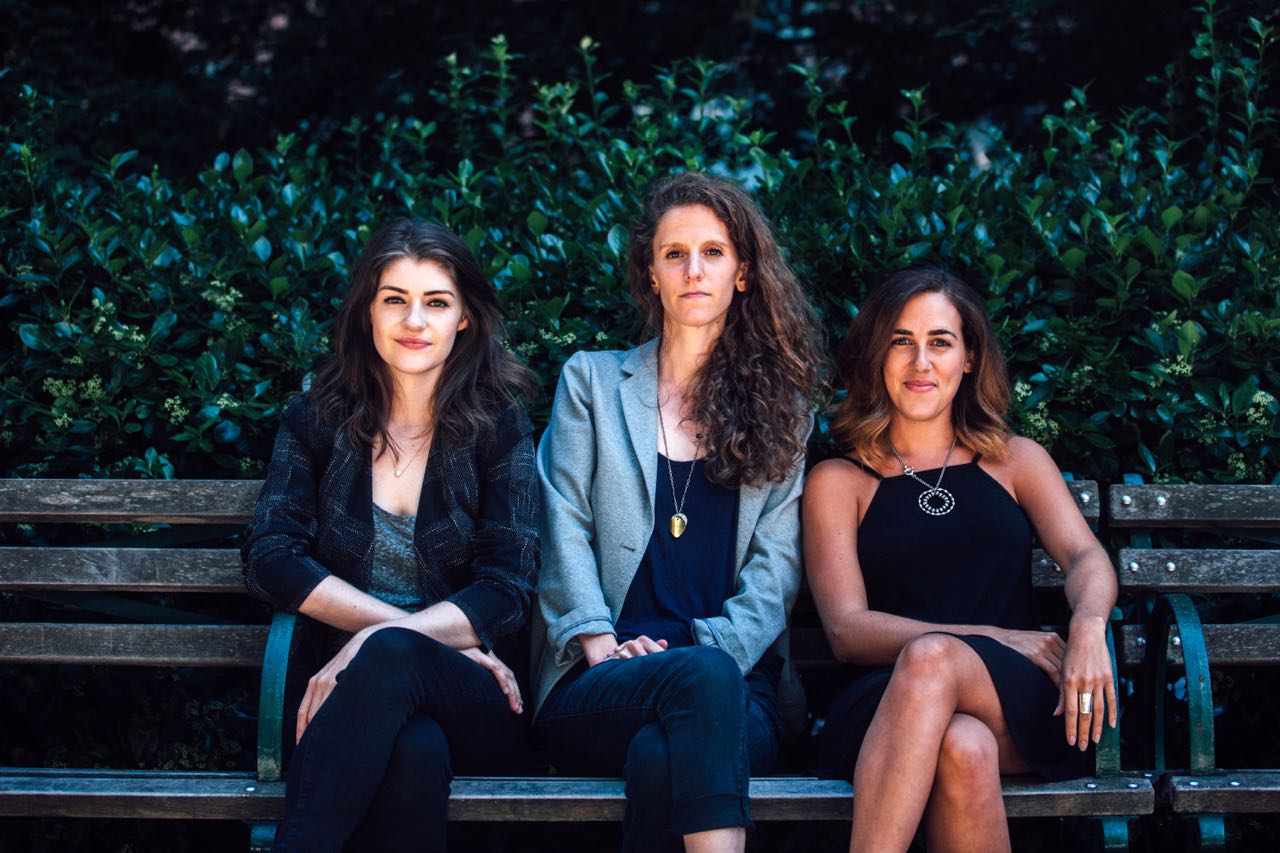
“Kali and Simone are artists, sisters, and (lately) roommates. They live, work, and navigate their mother’s chronic illness in close quarters and relative peace – until they meet Jo, a journalist wrestling with the cost of her recent assignment in Syria. As each sister becomes romantically and creatively entangled with Jo, all 3 women are forced to examine how they relate to their art, the world, and to one another. “A Lasting Impression” is a musical about love between artists, love between sisters, and the power of storytelling in all its forms.”
Book by Emily Kaczmarek, Music and Lyrics by Zoe Sarnak and Directed by Whitney Mosery. Performances July 13th and July 20th. For more info, click here.
What are you hoping audiences take away from the show?
Whitney: For me, what I’d like the audience to take away from this is an exploration of how we communicate. Not just with each other, but with our own experiences, and what forms we each use to try to somehow express all of the things that we are feeling and that we are going through. In our show, there are three artists who are each using different types of artistic expression to try to get at that form of communication, and each of them discovers ways in which their chosen forms of communication help and hinder it. I think for an audience to come away thinking really deeply about how they talk to each other, how artists try to communicate with them, what their experiences with the world are, and how we, in turn, as audiences, can interact with the art that’s put in front of us, and to try understand a little bit about the people who are creating it, but also about the world that they are reacting to and the situation that they are reacting to.
Emily: I hope that audiences come away with lots of questions that they’re asking themselves and asking the people in their lives about how they engage with art, how they engage with all the things that are going on in the world, and the degree to which different kinds of art are useful in navigating that. I think this show deals with the ways in which people can become creatively entangled and otherwise entangled. I think I want audiences to come away thinking about and asking themselves, “What role does art play in my life, and how does it affect and bounce off of my relationships?”
Zoe: I think ideally there’s a moment of self reflection that a piece like this can provide because, in some way, whether you’re a words person or someone who is viscerally moved by music or by images, we’re trying to get at the way that a person can shake you, or get under your skin, or lift you up. Whatever channel that comes through, I think it’s a little bit about looking at yourself and the way you interact with people, are changed by people. And maybe if you’re an artist, how you express that. I think whether you’re an artist or not, it’s really about the ways we shape one another.
What about this development process have you found the most useful or the most interesting?
Emily: For me it’s been incredibly fast. There’s a little bit of history with this project. Zoe had written a version, or a couple of versions, of this show starting five, six years ago. I came on board three months ago, and Zoe said, “Can you write a book? Do what you will for this developmental reading.” I was like, “Yeah, great.” It didn’t really fully land that that meant write a whole show in two months. That is what has happened. It’s been such a boot camp in a really great way, a really positive way, and I think having to write in that fast and furious mode forced us to have a lot of really hardcore structural conversations early on in order to make sure that was completely sound. I think that it felt visceral and immediate to write, so I hope that it feels that way to audiences as well because of just the time crunch and the pressure, and I’m really excited to see how audiences respond because I know what it was for me. I’m curious to see what it is for other people.
Whitney: With this particular piece, necessity is the mother of invention. Because we are doing a reading, and in a way, we are limited to just speaking and singing it aloud without filling in a lot of the visual design-based support that you might get in a full production, we’ve had to really hone in on the storytelling. We’ve had to hone in what the emotional beats are and how they are communicated through every single word and every single lyric, and making sure that the two work together so beautifully, and also sparely because there’s a lot of material, and so you want to be able to get three-dimensional characters, you want to be able to get nuanced relationships and how they develop over time. For me as a director, of course, so much of what I will hopefully bring to the project is the visual landscape that exists with the piece, but it’s been a really great developmental experience for me helping the conversation progress while imagining what the visual language can be, and yet knowing that I’m not going to be able to rely on that for story beats. In the piece, we have three different artists employing three different media: A visual artist, a writer, and a musician. In a way, musical theatre is exactly the combination of those three things. Hopefully the audience in the full production will be able to see how the writer’s responsible for having created the book, the musician is responsible for having created the score, and the visual artists is responsible for having created the visual world of the piece, and that somehow, the theatrical experience that we’re giving to the audience is the culmination of their lived experience.
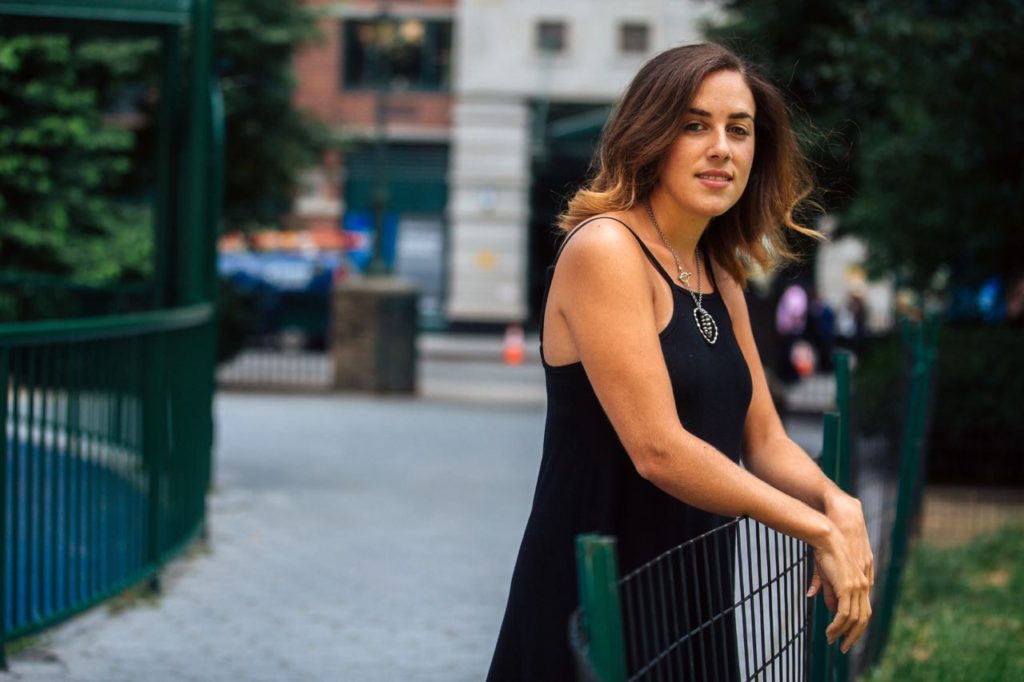
What’s something you think can be done to improve the development of new work?
Emily: I think space. Space in New York. I used to work at this non-profit, and we would hold events in corporate space in New York—these are enormous empty lobbies and empty rooms and entire floors that don’t have anybody working on them. How can we develop partnerships to be more efficient about using space in New York? I think that’s a huge hindrance to developing new work, is just paying for rehearsal space. Even the found performance spaces that are possible, I think. That sounds like just—not lofty at all, but it’s a huge barrier, I think, for a lot of artists wanting to develop the work.
Zoe: There’s an amazing array of developmental opportunities, but often they pull you in a lot of different directions, and especially for early career artists. You are so excited to do anything that you do the show here in one way, and the show there in another way, and it can become a bit haphazard, and you can lose what you’re getting at because we all love it. I think, what certain institutions do and what more can do is the long range developmental arcs, such that you feel supported and incubated in a way that’s not like, “Oh, I don’t know what is going to happen with this next, so right now I’m going to try fix this, this, and this,” and then it pops up again in a totally different context where you’re taking an entirely different path to the piece. There are so many institutions that do this, so that, I think, is wonderful. The other thing that I think I would love is engage with and acknowledge is the way that so many of us are musicians, and to play with music in a way that feels [organic]. We used to do whiskey [jam] sessions, and then go home and write. That spark that music allows with direct interplay would be nice to continue to weave into the developmental processes.
Whitney: I think that actually connects to what I was thinking about, because I think that there’s a very clearly defined breakdown of job descriptions between everybody who gets involved. The writer does this, the composer does that, the director does that. I, the director, am going to offer notes to the writing team, they’re going to go off, and they’re going to implement the ones that they like, they’re going to come back with them, and I’m going to communicate with the actors, and it’s all rigid. I know that there are groups who’ve committed to a more ensemble-based creation process, and I love that, but I also think just an industry-wide loosening of those very strict breakdowns can help so much, because I know personally as a director, I also feel like a creator, and I would like to be involved in the development of, or the creation of something from the ground up, and not just when it’s handed to me as a fully-functioning script.
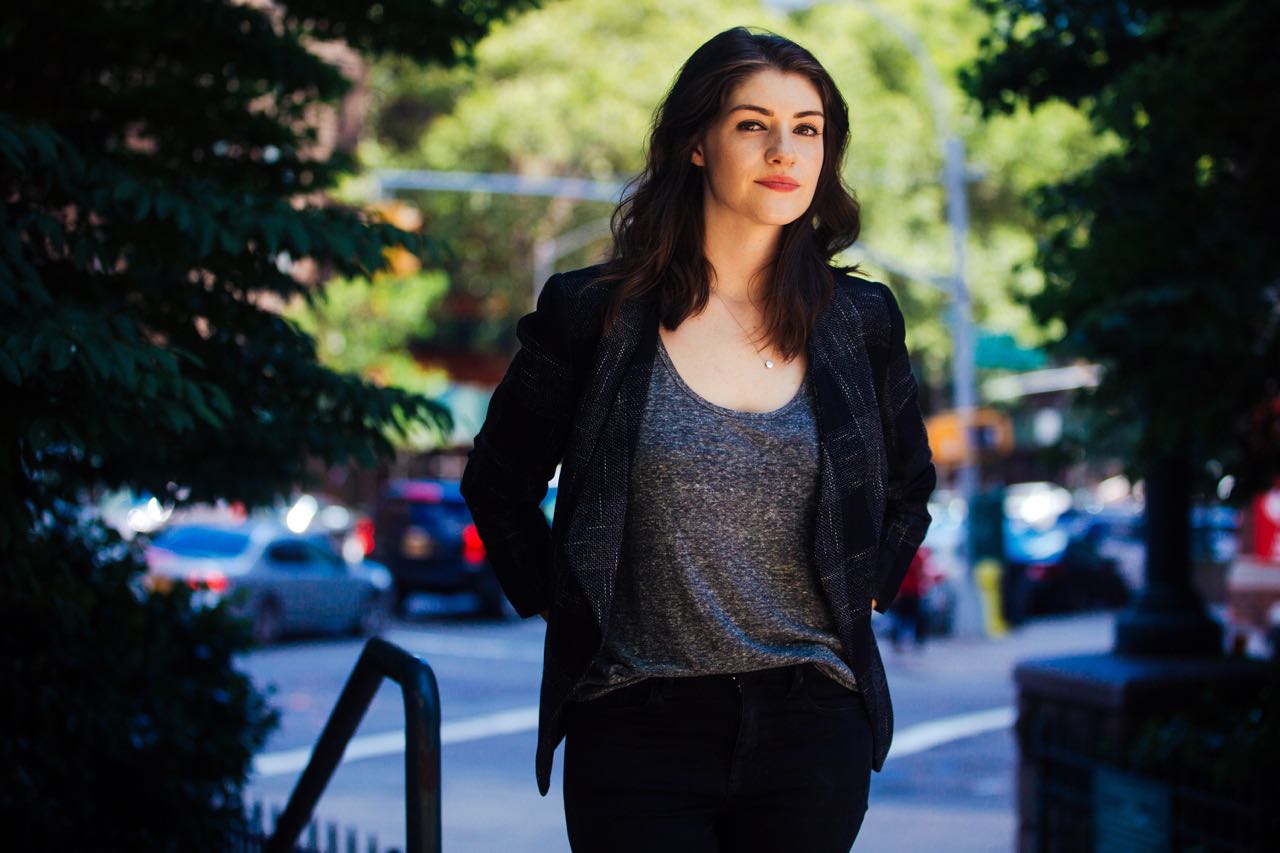
What’s something you think can be done to get different audiences to engage with theatre or get audiences to engage differently?
Zoe: I read an article with a description of a concert hall, and a non-Western audience member sitting in a concert hall and looking around shocked at the fact that everyone was sitting in their seat and listening to music, like sitting dead still. I’m not the kind of person who’s like, “There can never be a fourth wall.” I think that if we continue to consider why our form is so special, in that and it’s managing to hold up to a crisis of media, [of] television and recorded music and film. Part of the reason that we, as a form, manage to stay relevant, is because there’s something about that physical presence, and I would just love to go to a performance where an audience member wasn’t scared to be just tapping their chest and swaying during a song, but how rarely you see that? For me specifically, music, but actually language is so rhythmic and bodily, and the vibrations of the room are literally in your body, you hear with your body and your ears. I think I would love to see audiences stop having that thing like, “This thing is happening over there, and I am an observer and I’m not part of it.” When I see a piece of art, I should think that I’m part of it, because then we will have more power to show a story that doesn’t have to be saying something political because I’m a part of this story, I’m in the story as an audience member.
Emily: In my other life, I’m a teacher, and I work with teenagers, and teenagers of New York City. So many of them get to 15, 16 years old and have never seen a show, they’ve never seen a live theatre performance. My mother took me to see Joseph and the Amazing Technicolor Dreamcoat when I was three. There’s much privilege embedded in that, but it’s also, I think, when that doesn’t happen, there’s this dis-identification of, “That’s not for me.” I think there are so many things that can be done to alleviate that: Ticket prices, and expanded education initiatives. I think what Hamilton is doing is really great with their education performances, but there’s 10,000 students are going to get to see that, but there’s many more thousands of students in New York City, and all over the country and all over the world, and I think the more that we can engage young people of all backgrounds in theatre and in musicals, and get them to experience that thing of, “Oh, this is for me,” then the theatre will ultimately become much more democratic. I think, as with most things, the answer is in young people.
Whitney: I think my answer is pragmatic, but comes very much from the same philosophy, which is ticket prices. I think ticket prices have to go down; that is the single greatest barrier, I think, to access, and it’s also what perpetuates the etiquette and the conventions of what an audience believes that they are meant to do. When the same audiences keep coming to the shows, and those audiences are only people who can afford the work, the ticket price, then we self-perpetuate. I think beyond just ticket prices, it’s got to come from above. I think it’s systemic in terms of programming. My real belief is that artistic directors have to take a greater hand in programming work that tells stories, and specifically that tell stories that reflect the world and the way that it’s made up. But also that tell stories not through the lens of the outsider visiting a culture and helping the audience to bridge a link to that culture, but that actually is brave enough to give voice to the culture itself.
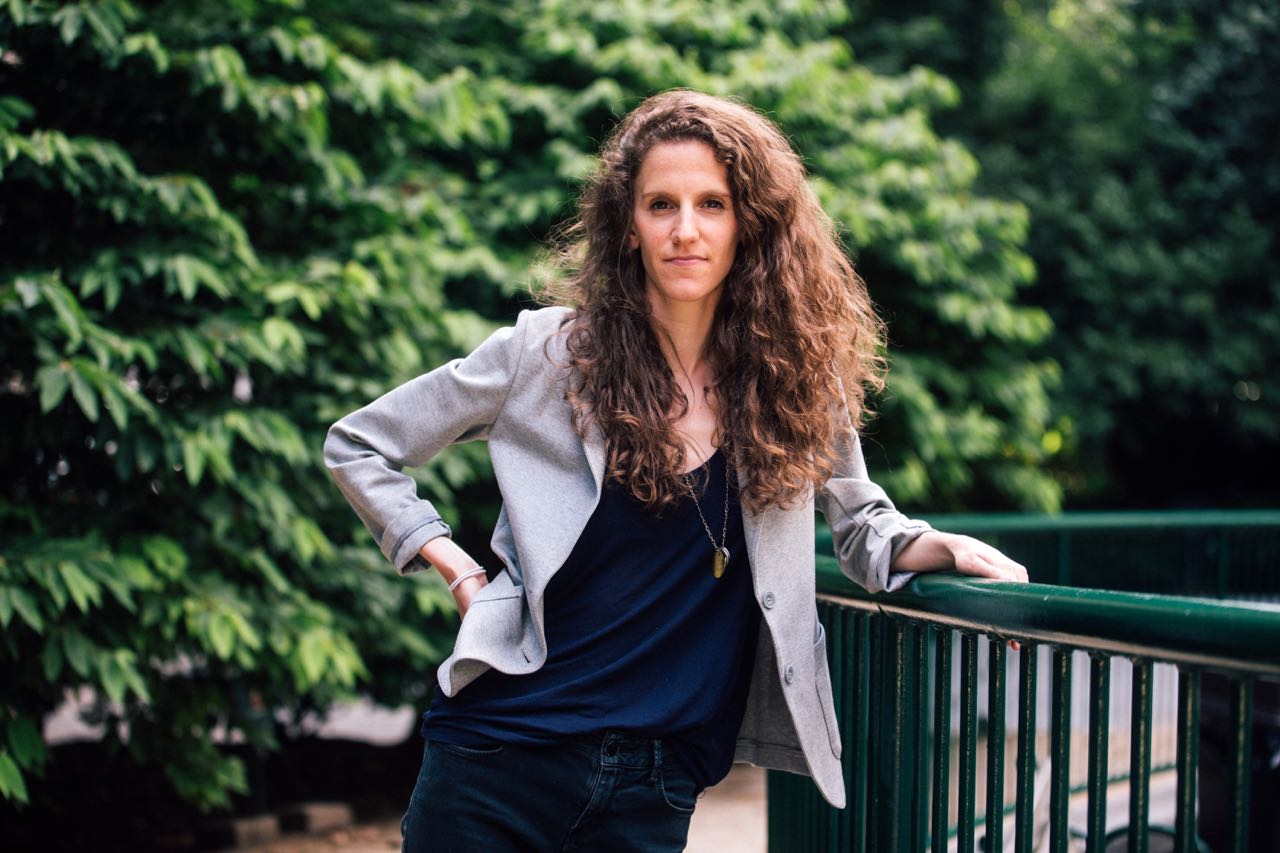
Beyond being located in America, what does the term “American Theatre” mean to you?
Emily: To me it’s two things. The first is my slight buzzkill of an answer, which is that I will feel really comfortable with that term when I feel like American Theatre is truly representative of the diversity of Americans’ experiences. When I feel it’s representative of what is really happening, and when it represents young people, and when it represents people of color proportionally, and when it represents women proportionally, and queer people, and people with disabilities, right? It’s a term that I struggle with a little bit in this moment, and in other moments. The other thing that I think of, on a slightly more positive note, is for me, American Theatre has come to really mean the history and the tradition of American musicals. It’s a really rich history that has bequeathed us many incredible examples to learn from and to inform new musicals. I’m really proud and psyched to contribute to that tradition. The musical form in the US is robust, and I think will continue to be.
Whitney: I find myself at a crossroads in trying to understand what it means to me now because I just moved back from being in London for three years. I grew up in New York having a very privileged childhood being able to go to musicals and plays on Broadway. I went and studied at RADA in London for my graduate program, and then spent, I think a total of three years living in London and working in theatre in London, and also traveling to the continent and going to Berlin and seeing the European influences of theatre and tracking its history. I feel that American Theatre is defined by a realism and a naturalism that was imported into this country 50 years ago, which has informed nearly every single major playwright, director, and actor, to come out of the American Theatre tradition. I’m excited by what I’ve perceived to be an influx of a more British, a more European, formal invention. I’m excited by the development that, as globalization and multiculturalism influences the American Theatre tradition, we’ll start seeing a bit more of the formal invention, I think, that comes with more non-American form.
Zoe: I will, as always, be personal and optimistic. I am the child of immigrants and grew up incredibly patriotic in a way that was never attached to some definition of what an American should be in concrete terms, or what American Theatre should be in concrete terms. Actually to me, the idea of American Theatre is that we are here, and that there seems to be a passion for storytelling in front of live audiences, and that it can be anything we want it to be. It’s engaging with the history, while not feeling confined by it. I suppose that the idea that a piece of theatre is particularly American is a little foreign to me, other than the fact that I feel incredibly, incredibly lucky to live in this country, which I realize, some people feel differently. I really feel lucky to live in a place where there’s opportunity to make a beautiful community, whether we’re doing it or not is a different story, but how beautiful that we seem to be really interested in theatrical storytelling and particularly in musical theatrical storytelling, such that we can make American Theatre what we want it to be, and the way you do it is by creating something.
Molly Beach Murphy and Grace McLean of Molly Murphy & Neil deGrasse Tyson on Our Last Day on Earth
Photography by Sofia Colvin
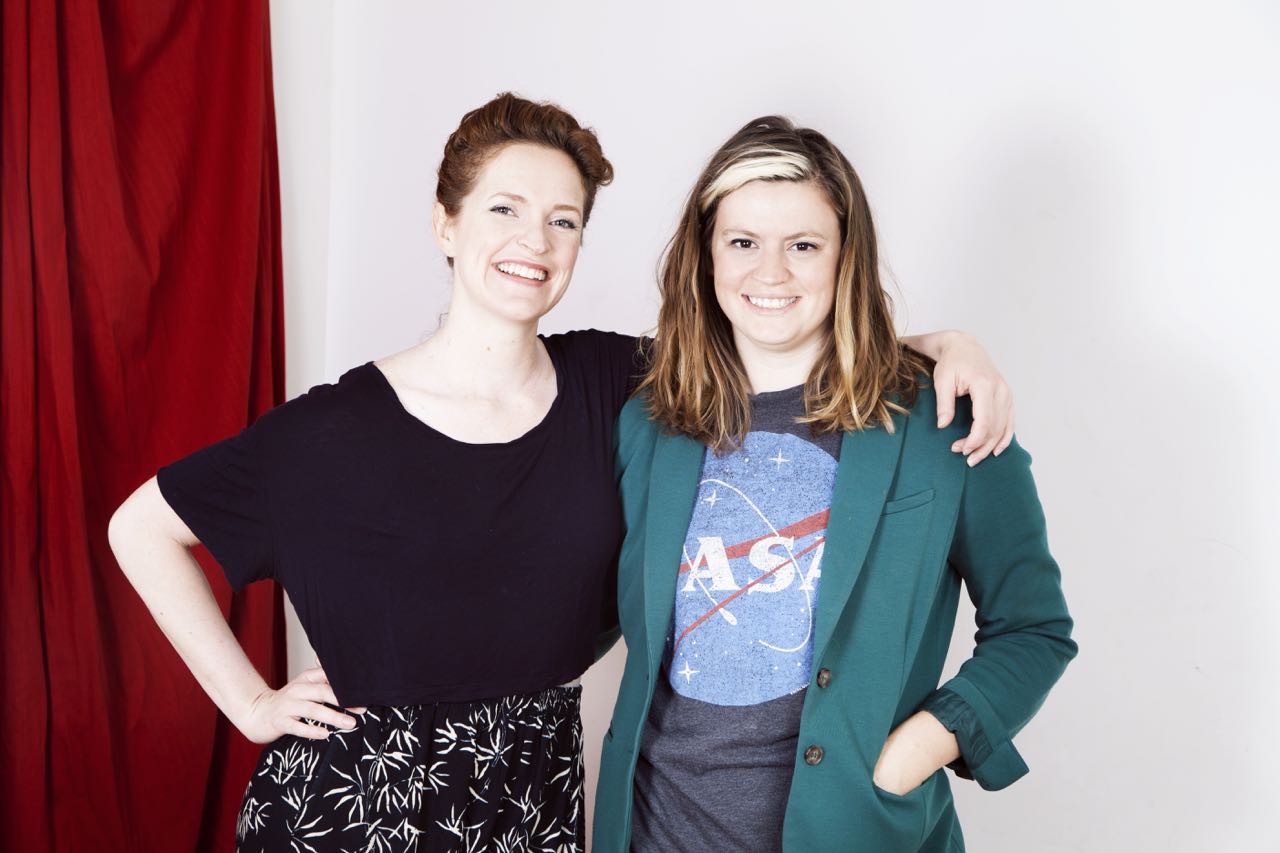
“Molly Murphy and Neil deGrasse Tyson On Our Last Day On Earth” is part indie lecture series and part musical cabaret. The story follows famous astrophysicist Neil deGrasse Tyson and his biggest fan girl through the Hayden Planetarium in the last 24 hours before the Earth is swallowed by a super-massive black hole.
Created and Written by Molly Beach Murphy and Starring Grace McLean. Performances July 12th, July 16th, and July 17th. For more info, click here.
What are you hoping audiences take away from the show?
Molly: A mixture of science and theatre. What I really love about both of those things is, at the core, they’re explorations of trying to find out more about ourselves and the world around us, and I think that they’re just very similar quests. So I want to do what Neil deGrasse Tyson does, which is say that these are the same things: culture and science.
Grace: Molly said something really interesting to me the other day about the little people and the big people, and the space in between, and the identification one may have with one or both. I think what Molly is trying to do here is recognize or embody both little person status, along with big pop star status, and see what happens when you really, very obviously fold the two on top of each other. I think that’s a really interesting idea.
Molly: And have those people doing the same things, which is trying to make sense of the universe.
What about this development process have you found the most useful or the most interesting?
Molly: NYMF, for the reading series, they provided us with a dramaturg. We’ve been working on this show for three years, and to have someone who doesn’t know anything about it come in and have a totally outside eye has been really, really helpful, because we’re like layers upon layers of jokes in, so it’s great for a dramaturg to come in and be like, “What is this joke?”
Grace: This is my first time being involved in NYMF in this capacity, as a performer. I’ve done a couple of concerts with my music and I’ve done concerts of other people’s music, but never a real exploratory endeavor. I am excited to dive into that, especially with this piece. I’m so happy that it’s Rachel Sussman who’s heading up NYMF this year. I think that she is trying to do a lot of… I know that she wants to push some boundaries with the Festival this year, and be sort of all-inclusive, and I’m just excited about the way that she’s working, and happy to be a part of her first year.
Molly: Yeah, we’re a weird theatre piece, and this is like a brand new idea for this to be a home for, for NYMF to be a home for a piece like this. It’s very exciting.
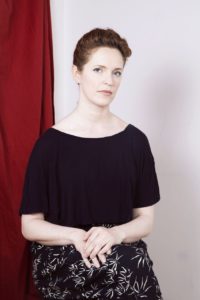
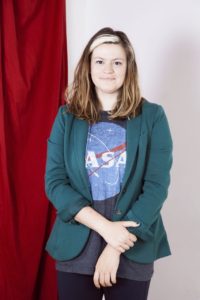
What’s something you think can be done to improve the development of new work?
Grace: Money, time, space.
Molly: Money, space, time, hearts, and souls.
Grace: I think this is a particularly special time that we’re entering into where pieces that are outside of the box are making their own boxes and getting eyes and ears, whereas a decade ago, maybe they wouldn’t so much. That’s a wonderful thing. I think that’s great. In terms of development, you know what I think really is important? I think having the opportunity to put a new work that’s still in process in front of people. I think that is so, so, so useful, and I think it’s particularly going to be useful with this piece.
What’s something you think can be done to get different audiences to engage with theatre or get audiences to engage differently?
Molly: I think stories or theatre pieces that tell stories about different people. Broadening the scope of the kinds of stories we tell and what they’re about, and broadening the scope of what we consider humanity and deeply human. For me, right now in this piece, that’s the sciences and astrophysics.
Grace: I think it has to do a bit with form. There is so much to be entertained by right now, but the human element of live theatre is the thing that makes it what it is. That’s always going to be there, but there are opportunities to play with the way that happens. There’s interactive theatre, there’s immersive theatre. I think there’s less of a prescriptive way to look at it, like this is how you do it, here’s how you have your acts. There’s definitely brick and mortar stuff, but I think that playing with how you build your skyscraper can look different, and that’s what’s potentially exciting about new theatre for audiences today. It’s not just a, you sit there in the dark and we’re going to do some stuff with lights on us and that’s it.
Beyond being located in America, what does the term “American Theatre” mean to you?
Grace: I think it has something to do with individuality and entrepreneurship, and telling stories of people who make something out of nothing for better or for worse, whatever that may mean. Something about strong individual voices as opposed to community, which I think we could probably use some more of.
Molly: I generally find nationalism pretty scary. I think American Theatre is, to me, international theatre because we’re an international people. It’s like Hamlet’s mirror we put to ourselves, and I think we’re very individual and different, so hopefully it’s the many colors and voices of the rainbow.
Rebekah M. Allen, Portia Krieger, and Emily Skeggs of Remission
Photography by Sofia Colvin
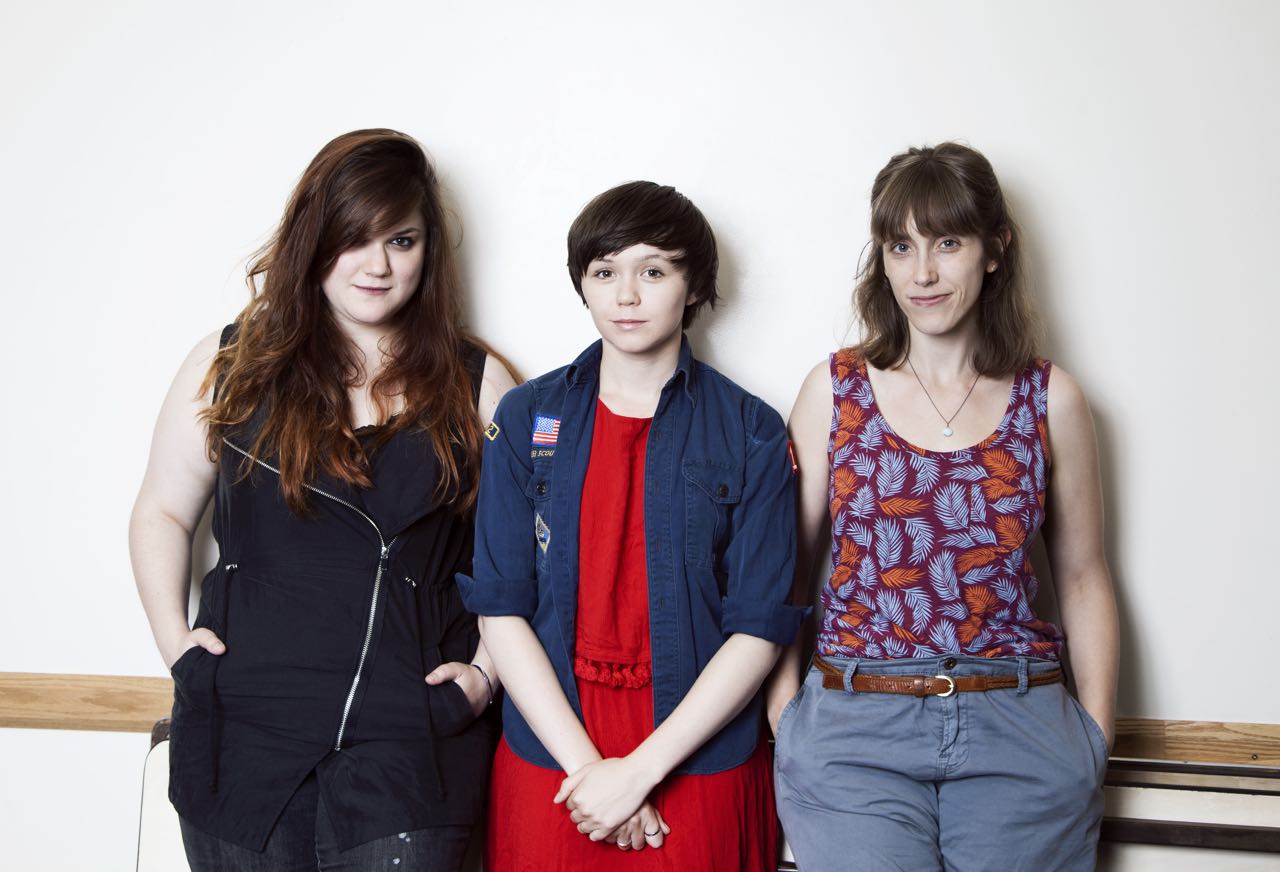
Davy is a lonely college junior who dives into storytelling and fantasy to escape a life weighed down by stress, family dysfunction, and a challenging roommate. When blindsided by an unexpected cancer diagnosis, paralyzed by fear and despair, Davy leaves her own disease untreated and unknown to everyone around her. She pours herself into the search for connection through the stories of others, in order to find her path through life or death decisions, learn how to tell her own story, and uncover the possibility for hope.
Book, Music, and Lyrics by Rebekah M. Allen, Directed by Portia Krieger, and Starring Emily Skeggs. Performances on July 11th, July 15th, and July 17th. For more info, click here.
What are you hoping audiences take away from the show?
Portia: The thing that really excites me about this piece is I find it to be so unexpectedly humorous and human and specific, in regard to this woman’s experience of cancer, which is something that is generally treated as sad, though it’s actually a really multifaceted experience. I think Rebekah’s play has done a great job of mining that. My hope is that people will find that reflected in the reading this week.
Rebekah: For me, writing of the show, a lot of it is that it’s an exploration of an experience, and doesn’t necessarily come to any major revelatory conclusion, but more crawls around inside a life and a bunch of choices, and a bunch of decisions that have to or don’t have to be made. I think that hopefully there are different things that different people can get out of it, based on their life experiences, cancer experiences, as well as a wide variety of other life things that they may be going through. I hope that there’s a bunch of different little pieces that people can connect to based on that.
Emily: I think Rebekah has written a bunch of really well-developed young people that encounter really specific difficult things in a beautiful way, that’s super relatable and empathetic. Even though their experiences are super specific, it’s very, very relatable. I hope there’s a sense of empathy for human life at the end of the reading, and how complicated that is.
What about this development process have you found the most useful or the most interesting?
Portia: We are super at the beginning of it. It’s very much still getting figured out, and our hope for this chunk of our process is to kind of just see what we’ve got. I think the cast and Rebekah have brought a wonderful sense of gameness to the process so far, in terms of a willingness to just try things out without judgment, and play and dive in imaginatively without having too much of an agenda beyond, let’s see what this is and imagine what it can be together.
What’s something you think can be done to improve the development of new work?
Rebekah: For me, a big thing that I hope to see, and I didn’t know existed until I moved here, was an audience’s willingness to come along with the creative experience. It makes me nervous to go into a reading presentation where you don’t know what the audience expects out of it. I’d love to start integrating the understanding that this is a multi-step process, that’s full of changes. You’re not coming into a finished product. I think it would be fun to make sure that the audience is aware, through many different stages of new work [development], that it is such a piece by piece adventure.
Emily: I think there’s a lot of pressure, especially in New York, which is like the hub of “successful commercial theatre,” that the goal is to be put into a Broadway house, and that’s not necessarily the goal for all plays and all pieces. The goal is to have an audience see something that you’ve put together. That is the goal, and that is admirable and awesome.
Portia: I think especially with a musical, or any kind of hybridized form, the audience is so important. I wish there was a way for us to shift the culture of development toward a rehearsal vibe. I work on a lot of straight plays, and I think we do a little bit of a better job in the straight play world of saying this is a reading, this is what’s in process. I’m always trying to integrate ways to help the audience think about what they’re seeing, and also try and give them a few ideas about what to imagine. Like you’re in the rehearsal room and you might not have the whole set, and so you say to the actors, “Look at this tape on the floor, that represents the set, which we won’t have until we get into the theatre.” I think it pulls that pressure off in a way that’s really nice and it’s interesting to the audience. I think people love to go behind the scenes and feel like they’re seeing something that is private or is unpolished in some way. I think there’s something exciting about the idea of actually letting the audience see that, as opposed to letting them see the cleaned up, highly polished version of things that we tend to expect when we go to a reading.
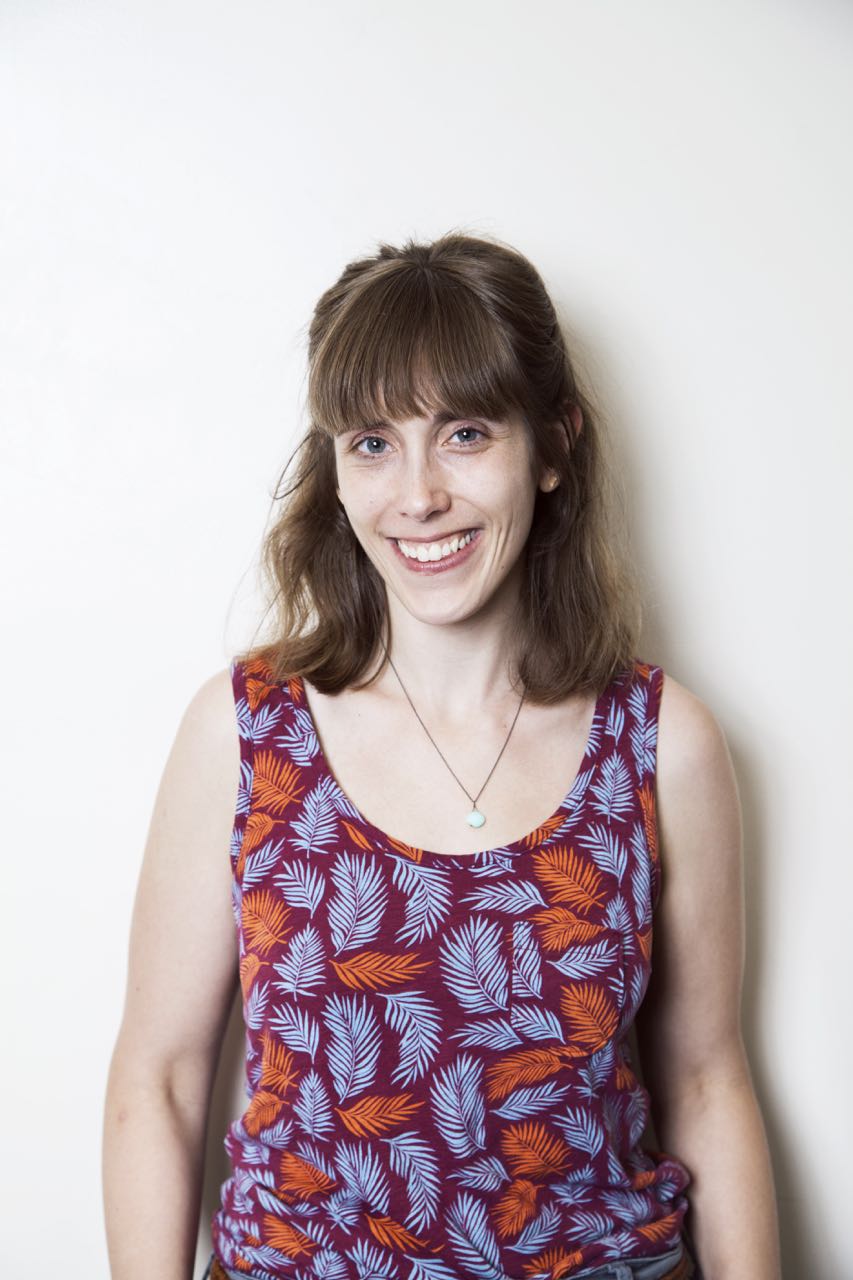
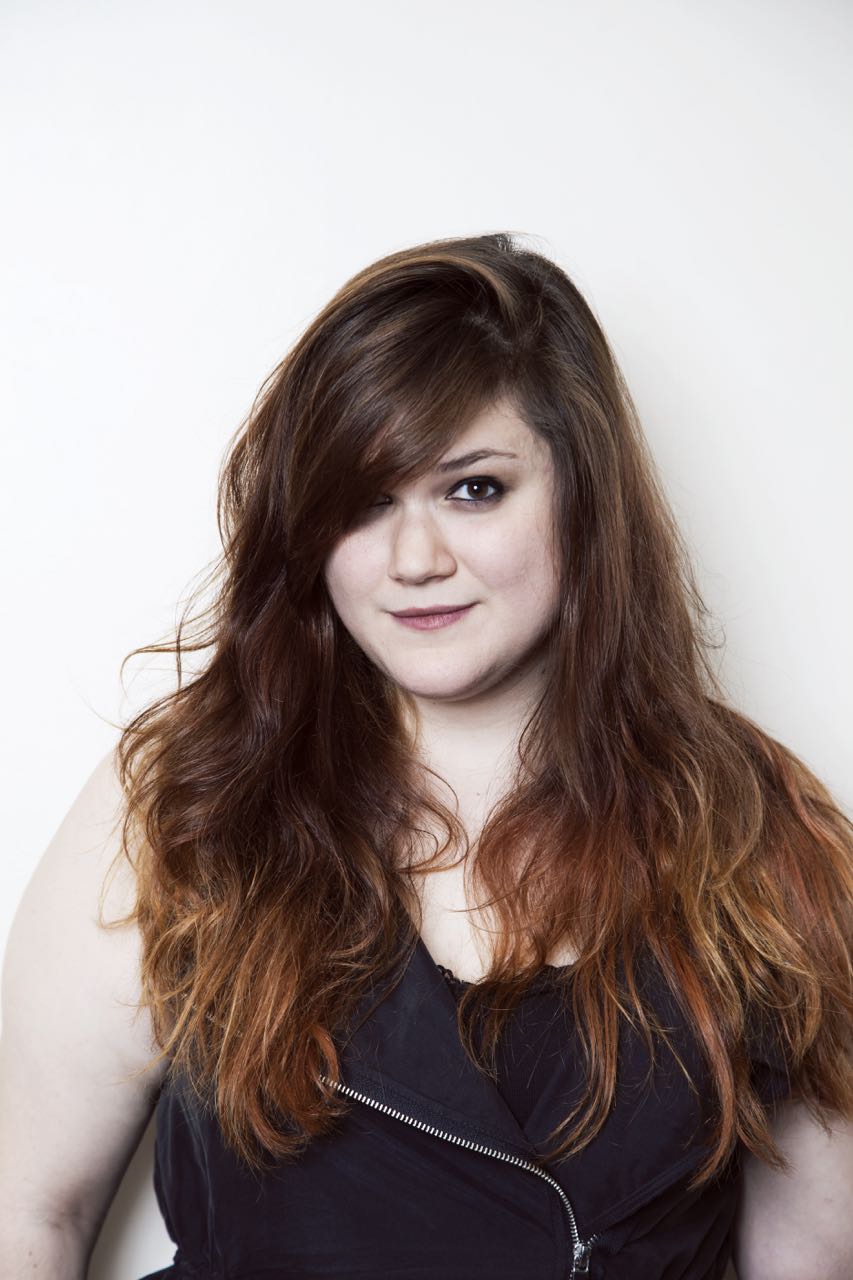
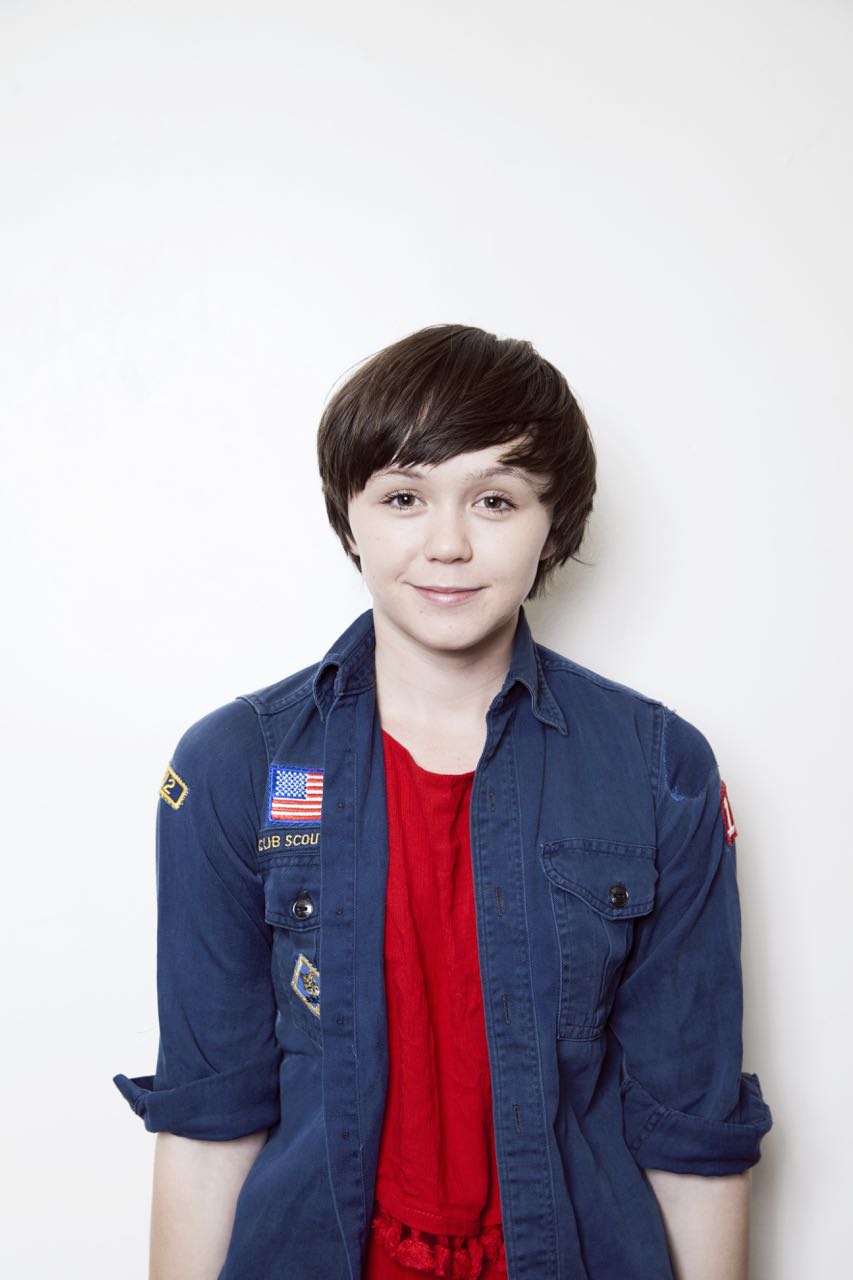
What’s something you think can be done to get different audiences to engage with theatre or get audiences to engage differently?
Rebekah: think that if you’re excited about theatre, you should be excited about the development of theatre. There’s hopefully a whole other level to that developing experience that comes with onstage productions that can bring in the audience in an entirely new way. I think that is on just a level of excitement, which is not necessarily anything you can inspire, but I think that welcoming audiences into those spaces can be cool, too. Audiences don’t often get into those [development] readings, they can often be closed or not publicized very much.
Portia: It’s so nice when you are able to make a space for people to interact when the thing is over. I just directed this play at Clubbed Thumb for their SummerWorks Festival, which takes place at the Wild Project, which is this tiny little theatre in the East Village, but it has this beautiful lobby, and people would just hang out after the play. We were able to have some really exciting conversations, it was very gratifying for us to be able to go out there and see that people had stayed. I think that what [theatre] offers that is unique is community and being in a space with other people. Giving that room for people to talk and interact seems important, and like a blessing to me when it happens.
Emily: I don’t think that audiences necessarily know or are told how important they are to the process of a piece. If we didn’t have an audience, we would just be a bunch of people saying things that had been written down in a room. Why do we do it for other people? That’s the question that I think audiences don’t remember going into the theatre: that they’re as much a part of the piece, and they bring their own things to the piece, just as we do. When you buy a ticket to see something, I don’t think there’s an emphasis on that—the idea that, yes, you’re buying this ticket and you’re going to sit in this room and watch this thing, but also the emphasis is you.
Beyond being located in America, what does the term “American theatre” mean to you?
Emily: I think theatre is a response, as much as any art, to what’s going on right now. I think that Rebekah’s play speaks to what it’s like to be young in a world where there are issues of mortality and there’s issues of health care, and there’s also issues of how do I afford college, how do I socialize, and how to be a being that is good for the world? I think that in that way, the piece is super current and means a lot to me, as a young person in the world.
Rebekah: A lot of who I am was formed by the theatre that I connected to. I think that is how American Theatre defined a lot of who I am as a person and what I do and how I express myself, and how I feel. And I know it does that for a lot of other people, too. I know that that’s a huge community across the whole world, and one thing that I talked about in a young professionals group I was in was how we can get theatre to kids across the country who are not coming to these shows. Making sure that it’s available to people, making sure that it’s accessible, and making sure that we all have access to that community, because it can change lives and it can save lives. I think that it’s important to make it a living, breathing body in every single way.
Portia: I think American Theatre is a million different things. I feel resistant to the idea that there’s something endemic to theatre that is made here, beyond that it’s made here, often by Americans. At the same time, I haven’t gotten to see so much theatre of other nations. The thing that’s always kept me coming back to the theatre is that it can be anything and be about anything. For me, that’s what’s really one of the things that really acts as a motor, is the breadth of it. The way that we get to explore anything and then dive really deeply into that thing. I don’t think that’s just American, I just think it’s just a great thing about theatre.

